#I’m as far from Catholic as they come but I was raised in this world and seeing Flanagan use it to round out this cast was so smart
Text
Trafalgar Law and Faith
Pre-emptive warning this is going to be another LONG metapost/analysis. There’s a lot I could talk about here but for the sake of structure I’m going to split this into three sections, i.e. the main ‘faith transitions’ that Law has gone through in the narrative thus far: 1. Flevance (catalyst for loss of religious faith), 2. Corasan (martyr that figuratively and literally saves law by giving him something to live for, introducing the will of D.), and 3. Luffy (cementing faith in this new belief system and regaining trust in the goodness of humanity through the living embodiment of everything Corasan believed in).
Before we get into all that though, let’s establish that Christianity is a thing in one piece. Speedrunning through some visual examples that come to mind; the Flevance church and nun (holding a celtic cross - censored in the anime version), a nun literally praying to God right before Marineford, Vinsmoke Sora’s grave marked with a cross (is op Christianity a northern thing?), Usopp and Chopper having crucifixes and holy water whenever ghostly stuff is brought up, Kuma and his trusty bible, the religious symbols on Kikoku’s hilt (could instead be more a reference to the Red Cross/symbol of humanitarian and medical aid as a doctor) and especially in whatever Mihawk’s got going on (though this could just be a Japanese cultural thing with Christianity being a minority religion or Oda just finding that some of the iconography, y’know. looks cool). There are also many other references to other religions e.g. hinduism, shintoism, buddhism, etc. Whether op forms of religion are the same as the real-world ones is debatable, and yes, Law being canonically raised as a devout catholic schoolboy with all the religious trauma associated with that is comical, but let’s take it all unironically for a hot minute. For fun.
1. Flevance
Law’s birthplace (Flevance) is described as being, at one point, “a very wealthy country with an unearthly beauty about it, with pure white soil and plants, like some kind of snow kingdom in a fairy tale.” The country’s wealth came from the very bedrock it sits on — white lead, which could be used to make various high quality products like tableware, cosmetics, weapons etc. When the wider world heard about this everyone wanted a piece of Flevance (the World Government also getting involved with distribution), and very quickly white lead became a “bottomless well of money”. So, hooray. Law gets to grow up in a rich city in a big house with educated doctor parents and probably gets to go to private school on weekdays and festivals with his family on weekends. One problem. In their greed, the Government and royalty have been knowingly hiding the truth about this supposed goldmine from the beginning. White lead is a toxic poison. Mining it from the ground over the last century and putting it in so many everyday products has resulted in it accumulating in the citizens’ bodies and leading to amber lead sickness, shortening their life-span with each successive generation – with the children of Law’s generation fated to die out before they reach adulthood.
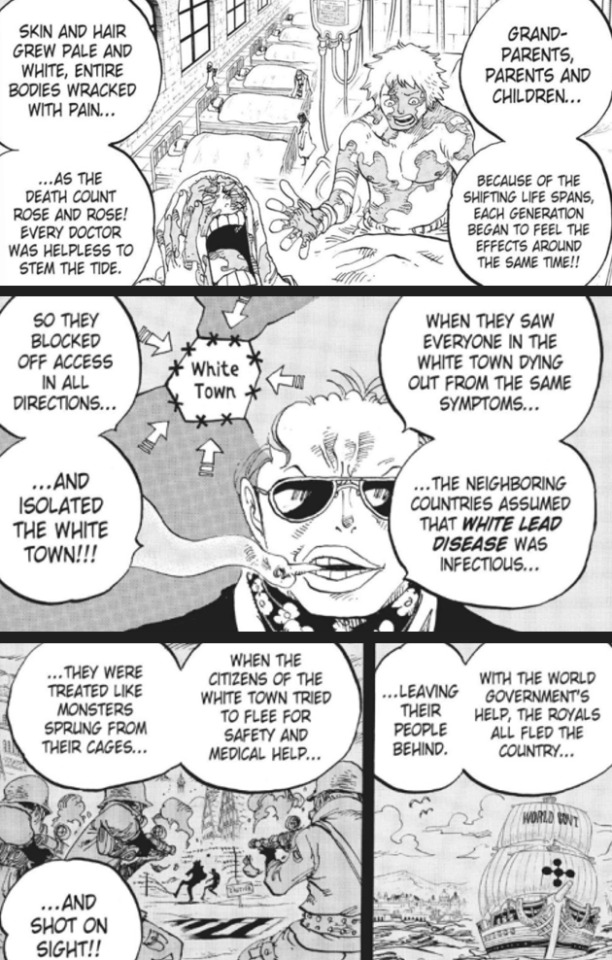
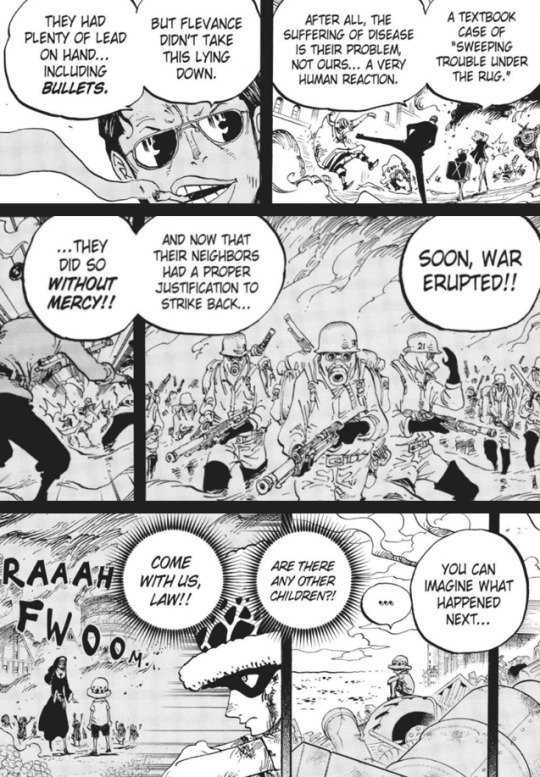
In the bible (especially in the old testament), God often inflicted these insanely disastrous events upon humanity, usually as some kind of punishment for their wrongdoings or as a test of their faith. Some events of which include (but are not limited to): famine, outbreaks of disease and natural disasters (e.g. hail, wildfire, earthquakes, floods). Historically, these stories played a key role in how humanity interpreted meaning from horrible disasters (e.g. assuming bubonic plague was sent as a punishment by god). Fire imagery is very common among these disasters as a representation for hell, which is clearly reflected in the destruction of Flevance.
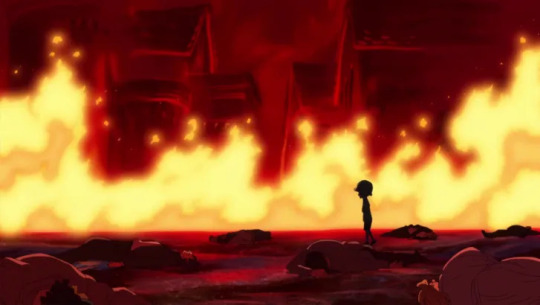

Sometimes these disasters had sole survivors act as messengers for God. With that context, let’s put ourselves back in the shoes of a ten-year old Law. Raised religious, freshly traumatised from losing his home, his devout family, all the comforts of his life, and having the outside world completely abandon him, this kind of event is likely going to be processed as some form of divine punishment. Law stumbles through hell, finds all his dead classmates, and the last words of sister nun echo through to him here. Merciful and salvation are huge catholic buzzwords – promises of holy compassion, deliverance and hope – and all of it fire and smoke and riddled with bullet holes before him. A genocide funded, perpetuated and covered up by the same body Law was promised was there to save them. And the only reason Law hadn’t died with them was because he wanted to stay with his little sister Lami, who was on her deathbed, and his parents, who were themselves trying to help the afflicted citizens, Law’s own father (before he was shot and killed alongside his mother) begging for more doctors, fresh blood, anything the world can offer, and asking “Why doesn’t the government announce to everyone that white lead is not infectious?”
Oftentimes (and in the case of Law), when there’s a promise of heavenly intervention or some miracle that doesn’t follow through, it results in an ultimate feeling of betrayal and anger. Unfortunately a lot of Catholic teachings also use a lot of guilt, essentially teaching people that the bad things that happen to you are your fault and there needs to be some sort of penance (queue Law’s survivor’s guilt that carries on down the road). But also, if this was supposed to be some divine punishment, for what exactly? For the town being blinded by the incredible wealth they were sitting on? Being lied to? Continuing to extract their livelihood, ignorant of its dangers? Punishment for who? His parents? His innocent little sister? For ten year-old Law? These people who believed in God, who were good people? That’s fucking stupid. None of these people suffered and died for any reason at all — certainly not for a sacred one. God hadn’t saved a single one of them. Law had to crawl out of hell himself by sneaking over the border under a mound of corpses.
Given everything that happened here, Law has every reason to fall into nihilism, and you can see how his upbringing would’ve bred a lot of the feelings of guilt, anger and resentment that you still see in Law (which would suggest that though this is where he likely cuts ties with the religious/Catholic component of his faith, growing up with these teachings in his formative years would definitely influence underlying beliefs about how the world works, and how Law behaves and subconsciously processes information), but at the same time, there’s usually some form of redemption and changes to how these patterns of behaviour can be approached later down the line.
2. Corasan
Fresh off witnessing his whole world burning down around him, Law meets Corazon at the very bottom of this pit of self-destructive rage and unprocessed grief. Rosinante himself mentions to Sengoku that the hatred in Law at this time reminded him of his brother, but beyond the anger, harsh pessimism, vengefulness, I think you have to reach to find similarities between them. You can see some fragments of Doffy in Law down the line at times, with Law seeming to enjoy violence (especially against the navy, but given what they did to Flevance, it’s some well-deserved retribution for Law imo), but I’m not so sure it’s the cruelty so much as it is the high he gets off his own flavour of justice. Doctor’s Hippocratic oath maybe, but never once does Law like seeing others die (even at this point, he’s in tears next to a dead body, even though he’s the one holding the knife), and later on in Wano he makes it explicitly clear to Zoro that he’d rather see the mission fail than have any of them end up dead.
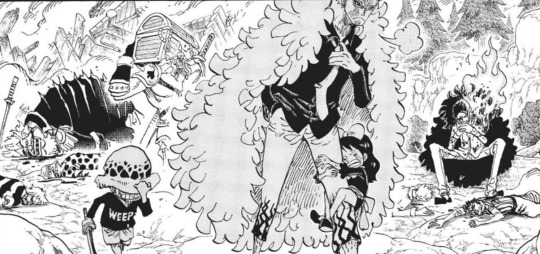
Little Law wanted to destroy the world and everything in it, but thinking rationally, what other choice did this kid have? He had no remaining family, was doomed to die before he hit puberty due to a terminal illness, was perceived as an infectious subhuman that most doctors would’ve sooner tried to exterminate than help. To Law, the world had turned its back on him – considering him a monster for simply surviving. He has all this hatred and pain boiling away with him with no tangible target to direct it towards. And this is the first clear cut rejection of faith that we see in Law. Any concept of a merciful God had just died. What God would allow this? Why is Law alive (a question that he repeats to himself throughout his life), why are these scumbags alive, why is the world going on spinning as if nothing has happened when his whole world had gone up in flames, why does anyone at all get to be here when everything I loved is gone? And it’s far easier to fall into a despondent nihilistic stupor than it is to work through any of that, and what’s the point in trying to process and move on from it, when there’s no hope for a future for Law anyway? When the only thing waiting ahead is more pain? What was this, if not a punishment? He’s supposed to be some messenger for God? How about fuck God, or whatever entity that exists that made him suffer this. Law’s not going to be a messenger for shit, thanks, he’d rather be their monster, he’d rather watch the world burn.
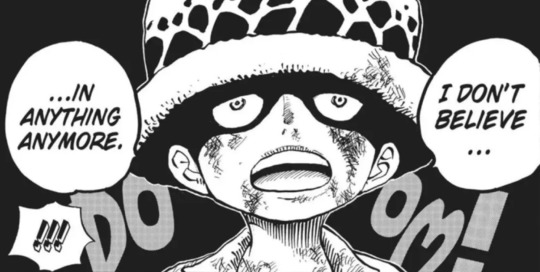
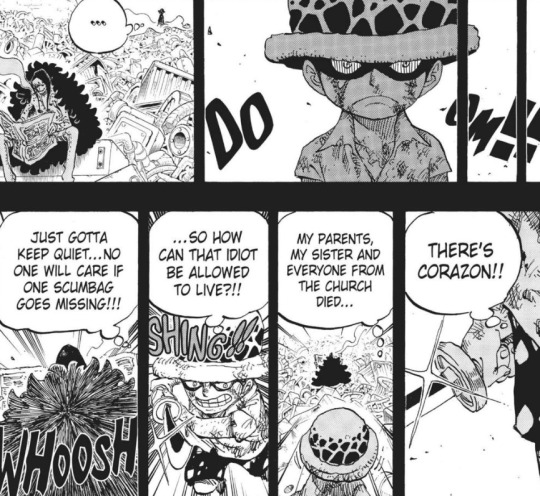
Corazon survives Law’s stabbing and doesn’t rat the little shit out (to Law’s confusion). It’s business as usual for another two years, then, one day Rosinante overhears his true name - Trafalgar “D” Water Law, and everything changes. On the back of his own beliefs, Rosinante dedicates himself to making sure Law a) lives and b) doesn’t become his brother. Law’s relatively short six month stint with Corasan forms the basis of Law’s new creed going forward, and all it took was a bit of kindness, love and humanity when the rest of the world had abandoned him. In the end Rosinante doesn’t save Law for the will of D. and the storm he’s predicted to bring in the future (as Law suspects), but he certainly believes in it, and the strength of Corasan’s conviction transfers right over to Law when he forces the ope ope fruit down the kid’s throat to heal him, tells Law he loves him, then sacrifices himself to set Law free.



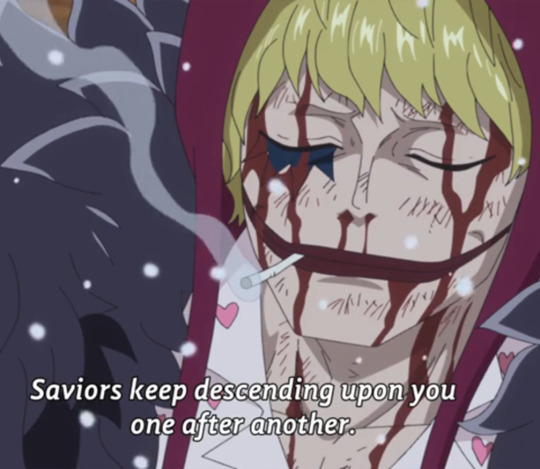
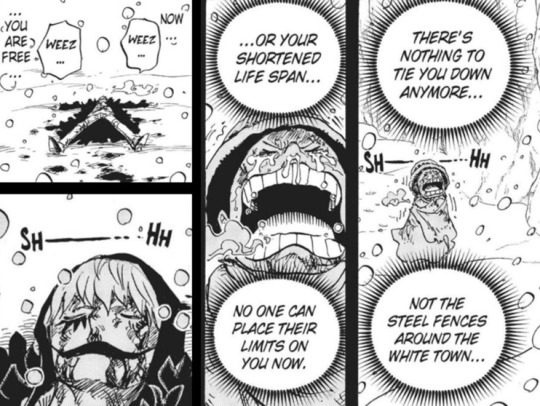
Law clings to that love he was given, he takes all these fundamental teachings and ways of thinking in regards to faith that were drilled into him during his youth, rejects the religion element and applies just about everything else to Corasan. He holds onto the last shreds of what Corasan leaves him with. Corasan becomes his “benefactor” (he gave my my heart), his saviour, his martyr.
And the crazy thing is, Rosinante was never really this saint Law makes him out to be. Law hated the clutz when they first met (mostly on account of Corazon throwing him through a glass window down at least two stories and into a pile of scrap). Corazon initially showed nothing but contempt for his presence (to ward him and the other children away from the Donquixote family, but these are still extreme measures). And it wasn’t until after learning Law’s name that Rosinante dragged him kicking, crying and screaming from hospital to burning hospital (not very saintlike in of itself), even after Law begged him to stop. Rosinante became Law’s saviour partly because of his belief in the will of D., and probably due to some guilt being a Donquixote, but mostly because he has always had a bleeding heart and he pitied (and had very quickly come to love) this angry, sick, deeply lost little kid. All this to say that Law’s faith in Corasan – this saintlike figure Law upholds him as in the future and the lengths he’s willing to go to avenge him/fulfil Rosinante’s purpose reflects the strength of the absolute beliefs Law would’ve been raised with in regards to God.
Whether it be out of survivor’s guilt (just one more body to heap on top of the Flevance pile), his love for Corasan, or for the sake of taking vengeance on the man that took away the one good thing he’d been able to regain in his miserable life, Law adopts Corasan’s will, the will of D. (which in of itself seems divine in nature), incorporates it into his new belief system, actively takes on the role of the divine punisher/justiciar and dedicates his life to bringing down Doflamingo.
3. Luffy
Catholicism dictates that the entirety of someone’s beliefs should be dedicated to one true cause (that cause being God) and expects people to ride on that, letting it carry them through life, give them hope, purpose, etc. But a lot of former Catholics choose instead to find that through something else. Corasan ignited the spark in Law’s faith around the will of D., but it’s not until he meets Luffy that this really becomes something that feels tangible and real for Law.
When Law saved Luffy in Marineford (putting the heart crew in danger for a stranger he met once), he said he did so “on a whim”, but that seems incredibly ooc for Law — this man that pretty much planned out how the rest of his life would go after the dust of Corasan’s death settled and he came to terms with the fact he wasn’t going to die at age thirteen like he’d originally thought. Circling back to the concept of Law being a sole survivor/messenger for God, it is interesting that Law is the one to seek out Luffy (given that Luffy is usually always the one either being abandoned by people or recruiting his crewmates), and Law is ultimately the catalyst for pulling him towards Dressrosa and Wano. There must be a REASON that led to Law deciding Luffy to be the most viable option out of the Worst Generation for an alliance (beyond blind trust in an unhinged captain that just so happens to also bear the initial D, and Luffy being one of the few captains crazy enough to go along with what Law was cooking up).
Law undoubtedly would’ve kept a peripheral eye on Luffy for some time before officially meeting him due to him being a rising competitor pirate and another “D” (I imagine the news of his utterly insane exploits would’ve made good reading material, too). The first time Law lays eyes on Luffy in Sabaody though, he still blows all expectations out of the water — crashing headfirst into the crowd of a slave auction and immediately committing a felony against a member of the most powerful upper one percent.
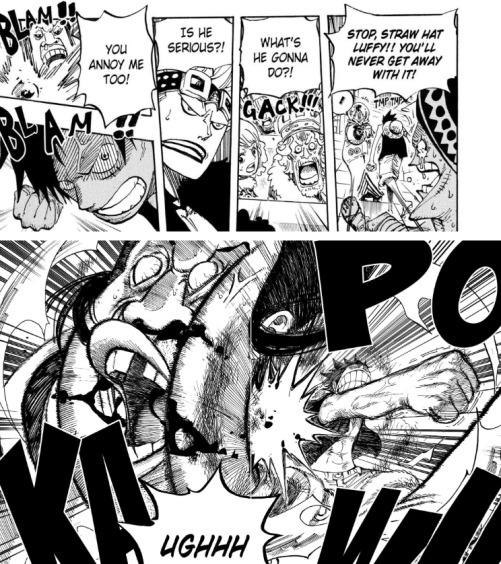

The world nobles are at an “untouchable God” tier in terms of class standing and believe it’s only natural for them to be entitled to whatever and whoever they want in this world that’s beneath them – the same kind of self-aggrandizing false divinity that Law has a a lot of repressed rage towards and that the will of D. is fated to oppose, so this, understandably, is a highly compelling first encounter, but it’s really only an initiating factor for what ultimately draws Law to Luffy. From their very first meeting (and probably before then, in the news stories and rumours Law likely picked up on), it’s made abundantly clear that Luffy does what he wants without a second’s hesitation, no matter the consequences, simply because he feels it is the right thing to do. Some call this an iron will, Law would be more inclined to call it willful stupidity and trouble, but time after time Luffy somehow manages to pull off what Law would best describe as “miracles”. And Law believes the straw hats just might be the ones to drum up another one for him.
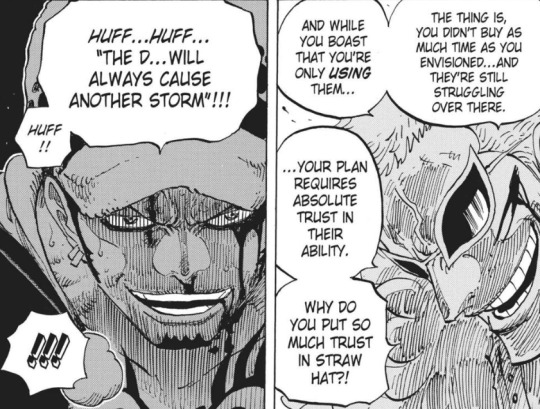
Luffy’s also got a lot of passing resemblances to Corasan going for him, e.g. inherently kind, compassionate liberators with big dumb hearts and wide goofy smiles in spite of everything they’ve been through, treating Law as nakama and saving his life despite his protests etc. All of which I’m sure Law hasn’t been completely unaffected by despite the high walls he puts up. And the more Law learned about Luffy the more it probably became clear that he is the antithesis to Doflamingo, i.e. what makes Luffy so goddamn dangerous and terrifying beyond his physical power is his ability to make friends with a simple kind of unconditional love that gets reciprocated enough so that these friends are willing to die for him.
Luffy agrees to the alliance, they successfully blow up Caesar’s base, and head off to Dressrosa. Now’s the time I should bring up that it’s taught in Catholicism that self sacrifice is the ultimate heavenly deed, and here Law is undoubtedly prepared to be a martyr for his cause. Law sends away his crew to Zou before Punk Hazard with the expectations that he’d never see them. He cultivates a fierce emotional detachment against Luffy’s willingness to bring him into the fold of the straw hats, and is resolute in that when the time comes, he will handle this himself, he will carry out Corasan’s will, and if he has to die for it, he will die with Corazon’s name plastered on his back. (Note here that Christianity is contradictory in that Law being this ready to die here is a sin, because revenge and suicide are highly discouraged, so you could say that by avenging and dying for his saviour, Law would be committing both the ultimate sacrifice and the ultimate sin).
Things get very dicey for Law in Dressrosa, to put it lightly. Doflamingo reveals that he was a celestial dragon (linking back into the will of D. “enemy of the Gods” notion), puts Law on the backfoot and gives him a thorough beating before shooting Law with a couple dozen white lead bullets in front of Luffy (because even when he’s winning Doffy loves to be a cunt about it). By the time Doflamingo is cuffing Law to the heart seat, it’s all looking pretty grim, and it’s very apparent when Luffy shows up to save him, that he is ready to die.

Law here has given up. He spent years planning his revenge for Corasan, but he lost, and he has very little left in the tank (physically, emotionally, spiritually). But Luffy doesn’t listen. Luffy who doesn’t think, doesn’t care, who trampled all over Law’s carefully laid out plan from the get-go and who is willing to take on Doflamingo single handedly for the simple slight that he dared to harm Luffy’s friend Law. Law will never find peace in his own demise because Luffy doesn’t do peaceful. He does loud and unashamed and open with no rhyme or reason other than the excruciatingly simply fact that he loves people and he thinks the people he loves deserve to have good lives. Luffy chucks Law over his shoulder and drags an injured Law across the city despite his protests (sound familiar?) and in the process inspires the fighting spirit in Law again.
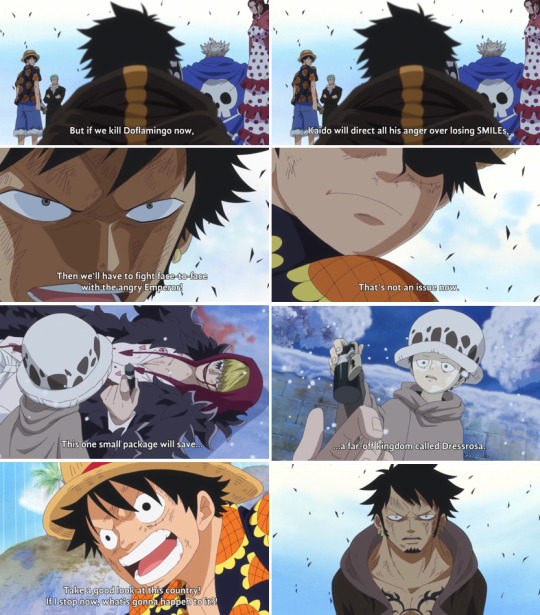
When Law confronts Doflamingo again with Luffy in tow, Law’s faith in Luffy confounds him. The last Doflamingo remembers of Law is this beautifully moldable dark pit of grief and rage who’d given up on believing, period – who wanted the world destroyed. Not so long ago, Law had been a candidate for Doflamingo’s next protégé. Now?
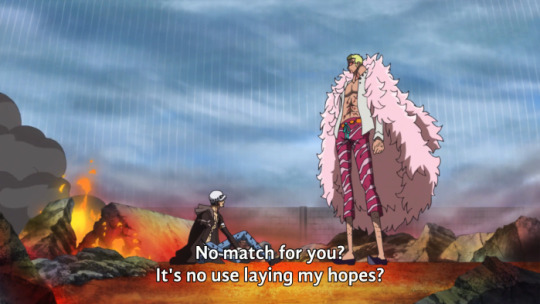
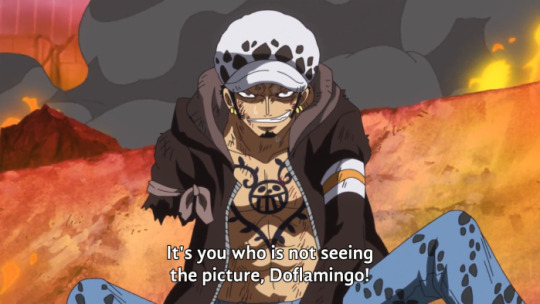

THIS is the action (grinning, staring down the barrel of a gun, flipping Doffy off as he tells him in not so many words that he may kill Law but he will never beat Luffy), Law’s unshakeable faith in the face of his own death is what has Doflamingo realising he will never regain control of Law again – is what incites Doflamingo to go from breaking Law down so he can build him back up again, to conceding defeat and outright killing him.
The trust that Luffy inspires in Law and the way he talks about Luffy (Luffy being this powerful, miracle-inducing liberator that Law can’t comprehend but follows anyway, Law laying down his hopes on him, weaponizing the will of D. to try and provoke fear from Doffy), is very reminiscent of the awe and faith talked about in scripture. Law discovers the feelings of comfort and hope that Catholicism was supposed to give him in Luffy, but Law’s belief in Luffy is a direct rejection of those teachings. Rejection by believing in a real life person as opposed to the divinity he was taught about. He’s also cementing his belief in the will of D., thus rejecting Doflamingo and all the people that embody the sort of “all powerful” divinity that he abhors (i.e. celestial dragons, Kaido, the Gorōsei/five elders) for the embodiment of hope and humanity.

When Law survives (again), he expresses he’d rather see Luffy beat Doflamingo with his own eyes or die with Luffy if he loses than leave. Then he watches, after all this talk of miracles, looking up in reverence as Luffy delivers, bright as the sun, haloed by the bars of a cage that’s haunted him for over a decade, Corasan’s words echoing at the back of his mind. God had never saved or freed Law, but Corasan was there for him, the heart crew was there, Luffy was there. And this is Law’s biggest, clearest rejection of religion – this newfound faith in humanity.
This faith in Luffy is put to the test again in Wano when Luffy is struck down by Kaido, but Law never truly stops believing that he’ll make a comeback. Even when the straw hats doubt whether he’s alive or not, something tells him Luffy’s not dead, and he holds onto that hope.
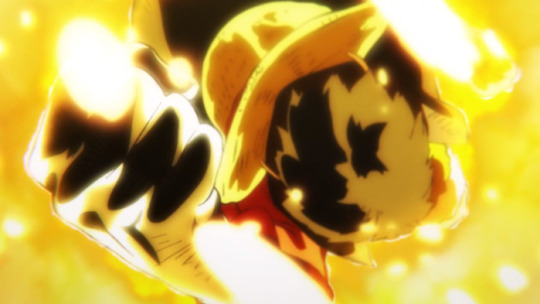


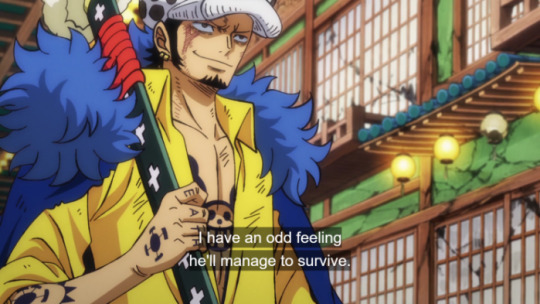
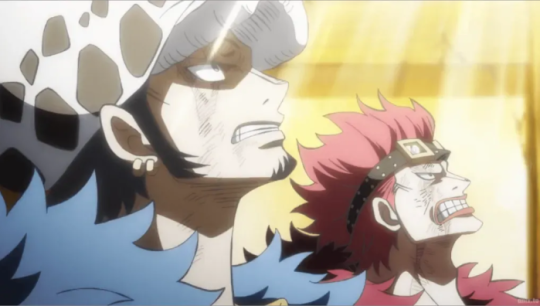
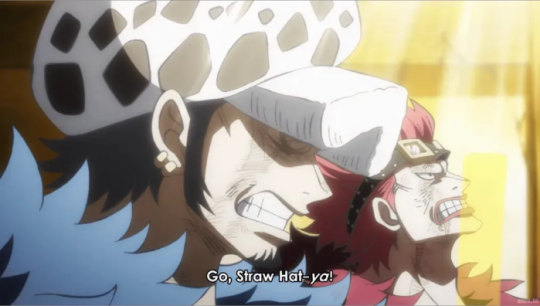
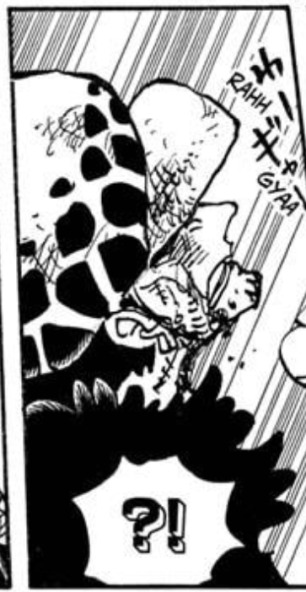

We also have the whole nika/joyboy backstory which really only reinforces all of this imagery/god-fearing looks of awe from Law and this idea of Luffy who is this perfect juxtaposition of empathetic and kind to incredibly fearsome fire and brimstone fighter. And regardless of whether you’re into the ship or not this is the impetus of Law’s relationship with Luffy for me, because here’s Luffy who has every right to have a chip on his shoulder and be downtrodden about all the injustices against him, here’s this little guy who against all odds, in the darkest of places, embodies light and hope and kindness and proves to Law that there will be hard times but there IS a happy ending at the end of the tunnel, despite it all. And everytime Luffy rises to the insurmountable challenge and wins, it just further cements that the will of D. is alive, that Corasan was right, that there's something redeemable in Law, a reason why he was worth saving, even if Law doesn’t understand it quite yet.
#merry christmas law religious trauma be upon ye#what’s an endearing idiot to a non-believer#long post#favourite character thesis statement. or something#ive been wanting to talk about this for a while but just been gathering my thoughts#will preface all this by saying I was not born or raised religious but the concept’s all very compelling from an outsider’s perspective#but I have had conversations about this to people like lesbianluffy who *were* raised catholic and relate to this experience#who I have to thank a lot for helping me wrap my head around this#this is a compilation of thoughts and conversations over the last two or so months#one piece#op#CJ's op watch-through#trafalgar law#monkey d. luffy#donquixote rosinante#donquixote corazon#monkey d luffy#lawlu#trafalgar d water law#gear 5 luffy#sun god nika#wano spoilers#lulaw#op meta#op analysis#one piece analysis
356 notes
·
View notes
Note
hi! do you have serennedy headcanons about luis and leon being parents?
Hello!! Of course I do omg are you kidding me!!!!!!! I have a whole tag on my main @wisecrackingeric-2 titled ‘DadSerennedyAU’ if you wanna see my own spin on the idea!!!!! ORRRR if you wanna read something from yet another incredibly talented artist and author I CANNOT recommend @mooseonahunt ‘s AU enough!!!! And I know the lovely @geddy-leesbian has made some posts on this subject also!!!!!!!
But in terms of Headcannons I have plenty!! I’ll put them below the cut to avoid clogging anyone’s dashes!!
Edit: THIS IS UH UM. V E R Y LONG. I WENT KINDA BUCKWILD WITH THIS ONE AHDNCHDNXUXJXJ SO UH PLEASE ENJOY I GUESS!!
• First and foremost they are t4t. Sorry I don’t make the rules (also. Look at my blog name HQNAHWNEHDNDUDJ /lh)
• I imagine it was probably Luis who wanted a kid- we don’t know much about Leon’s childhood other than the fact that his parents died (the very wonderful @highball66 has some more information on the backstory we DO have for him!!) and thus we don’t really have a good idea of what his relationship with his parents might’ve been- but Luis is the TOTAL opposite. We know from context clues that he had a really strong relationship with his Grandfather, who went as far as to encourage his love for science and the unorthodox in an incredibly strict Catholic environment, and it’s implied on some level that Bitores Mendez had some hand in helping raise him, so I can imagine that Luis is very attached to the idea of parenthood and would probably wanna be the same kind of man his Grandfather was to him!!!
• Leon???? Realistically???? Probably a whole lot more hesitant- like he almost dies on the job everyday there’s no way he’d feel fit enough to raise a kid. But also,,,,, this is resident evil and also fiction where we can do whatever the hell we want so hell yeah he comes around to the idea eventually!!!!!!
• Luis is probably accidentally VERY clingy with their kid/a lil overbearing during the toddler age. Everything he’s ever contributed to in his life has either hurt others or he’s destroyed it one way or another- and everyone he’s held closest to him dies in some way. And going off of the first point, he’s probably put a LOT of pressure on himself to be a good Dad like his Grandfather was, so that usually ends up with him hogging the baby HCNNSSNSJSNIS
• Leon, again similar to my last point, would probably have the opposite reaction where he has this gut instinct to keep his distance- like he’s worried if he gets too attached it’s all gonna be ripped away from him just like Sherry was all of those years ago. But I highly doubt either of their qualms last for very long- they’d talk things out and figure out something that works for the both of them <3
• They’d probably go with the same middle and last name as Luis- ‘Serra’ and ‘Navarro’. I know I keep repeating myself but Luis had a really good relationship with his Grandfather and his culture/heritage clearly means a lot to him (ie; the intro to Seperate Ways), so being able to keep that little piece of his history alive would probably mean the world to him <<33
• And going off of that, Luis is ALWAYS trying to encourage their kid to learn more about their culture and heritage- teaching them Spanish, cooking them traditional foods, etc etc etc and when Luis isn’t there to do it, Leon is always more than happy to do so <<<<<<33333
• Let’s be real,,,,,,, Leon is coming up with the cringiest baby names ever HXNEHENDUXNXU CMOOOOOON LOOK AT MR. WHERES EVERYONE GOING BINGO!!!!! But Luis probably isn’t much better BCNENWEJSJ I can easily picture him convincing Leon that noooooo Alonso or Miguel aren’t references to Don Quixote hahahahahaha omg what’re you taaaalking abooout. So anyways if it were a girl what about Dulcinea-
• I’m picturing them choosing to have a kid a lil bit later than most people (like,, late 30’s-early 40’s??? So not like they’re old or anything but it’s not like they’re having kids in their early 20’s yk HNCSHDNSJ) so for that reason in my mind they’d probably only want one kid
• Very predictable but they both read Don Quixote to their kid when putting them to sleep and/or they sing them lullabies in Spanish. Who here is surprised for that one certainly not me
• And once again WHO IS SURPRISED, the kid’s room is very subtly Don Quixote themed. Lil stuffed donkeys and windmill motifs everywhere you get it (<- normalest guy alive)
• Leon’s probably the one who does more physical activities with their kid- realistically, Luis is N O T surviving that knife to the back without some major lifelong injuries, so Leon’s the one who always carry’s their kid on his shoulders or swings him around when they’re playing etc etc
• I think Luis would be a lil sad that he isn’t able to join in on those kinds of physical activities, but he’d absolutely make up for it by taking their kid to work or teaching them general hands-on skills n stuff!!
• Leon ABSOLUTELY would wanna teach their kid self-defence as early as possible. He obviously mellows out and realises hey maybe teaching a 10 year old how to wield a knife is a Bad Idea, but with everything he’s seen in his life there’s no way he wouldn’t want his kid to know how to defend themselves at LEAST
• Wild-card one here but the three of them ABSOLUTELY take family trips to Madrid or other cities in Spain during the summer
• Last wild-card one but sometimes Luis will look at their kid and see his Grandfather so clearly he just starts fuckim bawlimg. Same with Leon. He sees the childhood he could’ve had and sometimes he’s gotta excuse himself to cry. Love these beautiful idiots
Tl;dr they would be very very wonderful parents who would love their kid with all of their heart and soul and you can put that headcannon from my COLD DEAD HANDS!!!!!!
33 notes
·
View notes
Note
Hi, first religion anon (NOT the same as the second religion anon). My main complaints are with TUC (mostly s1 but the ‘Jesus is real’ thing in s2 really bothered me) and the way that Laudna and a few other characters engage with the gods on CR. I have 0 complaints with Sam, I think his engagements with religion as both Scanlan and FCG are fascinating. I think things like ACOC and Kristen on D20 are done fine, but when they move outside of Christian allegories they tend to stumble. I know Brennan and Ally have philosophy backgrounds and Emily has a religious studies background, but frankly I’m not super confident in American universities’ ability to make people deconstruct Christian hegemony, and things like Emily using the phrase “Judeo-Christian” aren’t super encouraging to me.
thanks for clarifying, I was wondering about the second anon bc I was like "the first anon came in being fairly normal even if I don't agree and this feels...bad and also just a hunch but it feels like it's coming from a Cultural Christian who is not American. (also I did get your follow up question and I want to answer that one separately bc I think it's a good but separate point).
I know it's not terribly popular to say but being weird about the term "Judeo-Christian" feels like one of those things that Jumblr and other people in Jewish Millennial/Gen Z spaces online made a big deal about and I'm like "uhhhhh this was a thing my actual Jewish middle school teachers said sometimes; it's not the best term, no, but it was the go-to term in a lot of contexts until quite recently to the point that yeah, Emily going to school in the 2000s would probably hear it even from Jewish profs, and so it's not so much a red flag as a sign that she graduated before 2010."
I also honestly don't mind Jesus being real in TUC 2; at some point if you've decided all other mythology is real why not Christian religion. It feels, in a way, far more Christian-centric to treat Christianity as something that cannot be incorporated, as too real, as compared to say, Norse or Greek myths or Golems.
I will say that I agree that Ally and Marisha do tend to be a bit more limited in how they engage; I actually don't mind Laudna's frustrations with the gods from a "I think this comes from Marisha's personal feelings" perspective more so than a "could we...actually explore this as a throughline rather than a bunch of random-ass statements." I do think that Ally does tend to pull from their own experience; understandably so, but yes, it's very different than my experience as someone not raised Christian let alone strictly so.
I guess, and this might just be difficult to do as an anon ask thing, that I am looking at this very holistically. I am looking far more at what the GM is doing than an individual player, and I haven't had issues with Matt, Brennan, Murph, or Aabria's portrayal of divine forces. I find that Worlds Beyond Number has been explicitly very not Christian (and indeed, heavily influenced by Shintoism and pre-Christian Irish religion) in how the spirits are portrayed, and while I think Matt does tend to draw a lot from Catholic architecture and imagery and vibes, the way the gods engage with the players does not feel exclusively Christian (notably in Campaign 2; none of Fjord, Caduceus, Yasha, nor Jester's experience feel inherently cultural Christian beyond the fact that Travis mentions he doesn't feel like he can connect with the Luxon because 'it's a shape'). So it means I'm not looking to Ally for example for an exploration of religion that is as accessible to me, but I do find that actual play on the whole feels fine. I find a lot of the claims do feel like they get really hung up on specific details (eg: the Santa jokes in Chetney's backstory) instead of the overall feeling (eg: the fact that many of the deities have a very open, fluid, and at times intellectual form of engagement; the fact that the general message is that suffering is not purifying but rather simply sucks; Melora death domain traditions and especially Caduceus's philosophy which is very much outside American Protestantism; the polytheistic society of Vasselheim.)
29 notes
·
View notes
Note
Looking at your rant on the Crowley-Lucifer theory as a Jewish person myself who actually majored in World Religions- I one hundred percent agree with everything you said. It was nonsensical from the start and I'm glad Neil ran it into the ground. Even without the S1 line stating that Lucifer was not Crowley, Gaiman knows his religion and mythology. Definitely knows it better than the majority of GO fans do. And you didn't come across as antisemitic or ignorant to me at all, idk what that other person was on about.
Thank you! Seriously, this is a huge relief. I know I shouldn’t get this angry about it but I have vast respect for Jewish people and the Jewish tradition and so being accused out of the blue of ignoring or diminishing Jewish people or Jewish thought is incredibly upsetting to me.
I personally am not a Christian (if anything, I’d consider myself a Hellenistic pagan, or an atheist if called upon by those I didn’t want to talk about that faith with) however I was raised in the Catholic tradition albeit unwillingly pretty much from the start. I’m informed on Catholic Christianity from that context, but I feel no connection to it or protectiveness of it (indeed, I welcome future iterations of GO absolutely tearing into Christian dogma, I think it’s hilarious and fertile ground for satire). I also took several courses on religion in college, both on the Christian and Jewish tradition. I don’t claim this makes me an expert by any standard but I am at least educated beyond a casual understanding of these faiths, I would like to think.
Anyway, it’s actually my gut feeling that a pivot from a context where Christ is the explicit son of god in GO to one where the Jewish tradition was actively called upon and needed to understand the text would be absolutely fraught with potential to give offense to the Jewish faith. It’s one reason I think GO stays far away from invoking the Jewish tradition, specifically out of respect.
GO takes place in a fantasy world where the Antichrist is real. To say the Jewish tradition is active would imply it’s only accurate to a point and then it becomes inaccurate because it would mean that Jewish people were wrong about Jesus being the Messiah, ie it means that in that universe Jewish beliefs are wrong and then superseded by the objective existence of Christ as the son of god and the events of the Second Coming, which is an incredibly offensive thing to say and ground that is incredibly fraught with echoes of arguments from the history (and present!) of Christian bigotry towards Judaism. It’s not disrespectful, in my opinion, to separate out the Jewish tradition from the discussions of GO lore, quite the contrary, to borrow from Jewish and Christian tradition while giving Christian dogma and its Messiah preeminence within the story as objective fact would be far far more offensive, and I personally think Neil understands that.
20 notes
·
View notes
Text
Holding a rainbow flag, Marco Marras walked on stage at the start of a rally being held by Giorgia Meloni in Sardinia during her election campaign to confront her about gay rights. As security men moved to shoo him away, the student told the Brothers of Italy leader, now Italy’s first female prime minister, he wanted to be able to get married and raise a family in his own country. Meloni replied: “You want a lot of things … everyone wants things; you already have civil unions.”
If gay people in Italy, a country that regularly ranks in reports as being among the worst in western Europe for LGBTQ+ rights, had already understood that privileges so far gained were threadbare, Meloni made it explicitly clear they would not get any better under her government.
“I acted out of a sense of duty,” said Marras, 24. “Meloni had come to Cagliari to meet an audience of ‘yes men’, people who support her and who call her ‘great Giorgia’. I wanted to show something that her electorate doesn’t want to see or accept – LGBT people – we are not monsters but normal people who want basic rights. She practically responded: ‘Be happy with what you have’ – they think I should live a lesser life because I’m gay.”
A government led by Brothers of Italy, a party with neofascist origins, and including Matteo Salvini’s far-right League and Silvio Berlusconi’s Forza Italia, was sworn into office on Saturday. The first formal step towards its formation resulted in the election of two controversial figures: Ignazio La Russa, a Brothers of Italy politician who collects fascist memorabilia, and Lorenzo Fontana, a League member with anti-abortion and anti-gay views, as speakers of the upper and lower house of parliament respectively.
Italy enacted a civil unions law in 2016 when the country was governed by a coalition led by the centre-left Democratic party, but the bill stopped short of legalising gay marriage, while a clause that would have allowed a person to adopt the child of their same-sex partner was scrapped after pressure from rightwing parties and the Catholic church.
A common feature of the rabble-rousing speeches given by Meloni, a self-described “Christian mother” who says she defends traditional family values, is the reiteration of her view that a child should only be raised by heterosexual parents.
IVF for homosexual couples is banned in Italy, forcing people to travel abroad to become parents. Surrogacy, meanwhile, is prohibited outright, and Meloni has proposed extending a ban to criminalise gay couples who seek surrogate mothers abroad.
“It’s shocking, you could risk jail or fines regardless of where in the world your child is born through surrogacy,” said Monica Savoca, who lives in the Sicilian city of Catania with her Spanish wife, Maria Carreras, and their two children. “This discussion over surrogacy is part of a medieval vision. We felt afraid after the elections – they call themselves ‘moderate’ when, in fact, we’re talking about an extreme-right government that shouldn’t exist in Europe.”
Some cities and towns in Italy have embraced gay parenting, for example by allowing children of same-sex couples to be legally registered with the surnames of both parents. However, authorities in other areas have been less welcoming, such as in Catania, where the town hall is being taken to court by Savoca and Carreras after it refused the registration procedure for their children – Pau, 12, and Mia, 11.
They said they had never felt discrimination in terms of acceptance of their family in other areas of society. “I must say that society is much more open than the political world,” said Savoca. However, if they lose their case, and given the current political climate, they are ready to leave Italy and return to live in Spain, where they were married and both children were born via IVF, one to each mother.
They are especially afraid about the appointment of Eugenia Roccella, a Brothers of Italy deputy who in 2017 said she wanted to either abolish or significantly modify the civil unions bill, as minister of families, births and equal opportunities. Roccella said the bill had damaged the traditional family, and also rejected a law that would have criminalised homophobia, arguing that it compromised free speech.
“This government shouldn’t only make us in the minority groups afraid, but everyone,” said Savoca.
Italy’s new prime minister has repeatedly said she is not homophobic and will not try to repeal the civil unions law. However, there are fears her leadership will trigger a rise in homophobic attacks. The law that would have criminalised homophobia, drafted by Alessandro Zan, a gay politician with the Democratic party, was shelved last year after being boycotted by the rightwing groups.
“When the law was a theme there was a reaction in terms of an increase in homotransphobic incidents,” said Zan. “This is because people who acted out their discrimination felt authorised to do so. It will be the same with the demonisation of gay families. For this reason, we need to be really tough in opposition as we cannot accept that parties exploit human rights to obtain a political dividend.”
Marras, who was hit with a barrage of online insults over his confrontation with Meloni, worries that her government will attempt to justify homophobia, and may try to tamper with the civil unions law.
“They could amend the law to allow ‘conscientious objectors’, who for example could be mayors who are permitted to refuse a civil union for moral reasons,” he said. “So they maintain the law but block its implementation.”
45 notes
·
View notes
Note
Getting over the internalized bigotry that I have as a trans man is so freaking difficult. More difficult than I think I even know.
I was raised Catholic but was around conservative southern Baptist folk all my life and the preacher I used to go to with my grandma spewed some of the most blatant homophobic and misogynistic shit I have ever heard, I just didn’t realize it then. But it did have an effect on my world view since I heard so much of it so young and none of it was challenged by those around me, as much as I hate to admit it. It’s also because I have a hatred for my former self and all it’s femininity, which I’m also trying to change. I also notice it when I see young people express and present how they want and not face the backlash from family and society that I would’ve if I came out fully living in the Deep South. I feel hate because they have what I never could: a comfortable childhood being trans or gay or whatever. I know this is flawed as hell because virtually EVERYONE faces bigotry at some point whether it’s from family, friends, social media, or even from within themselves. (I’m working on this with a therapist.) Ever since I’ve presented as masc 100% of the time and am working to get my papers and bits in order, I’ve been expected by society to carry on these hateful ideologies, ESPECIALLY since I still live in the rural south and it’s almost universal. When my friends or boss or just some cis dude in my life makes a tasteless joke or perpetuates bigotry in any way, I’ve found myself laughing or agreeing. This is because I relate to the hate. But I’ve begun to realize that the reason they’re doing it is because they actually hold genuine prejudice against people, or at least are too ignorant to realize. I do not have the same hate as them.
I realize now I make far too many over generalizations and must come to terms with my own bigotry.
I internalize misogyny because the mere sight of myself as a woman makes my skin crawl.
I internalize antifeminism because feminists I’ve seen and interacted with exclude me and all males, cis or trans, from the conversation.
I internalize homophobia because queer people where I’m from are forced to stay in the closet, sometimes for their entire life.
I internalize transphobia because every time someone tells me to “be who I am am”, I have to think about how my mere presence as a trans person may cause unease and/or violence.
This along with my upbringing are things I must overcome.
Phew, that was a lot.
#trans#transgender#transmasculine#transmasc#ftm#trans guy#trans man#transgender man#transgender guy#religion#catholic#Catholicism#internalized misogyny#internalized homophobia#internalized transphobia
19 notes
·
View notes
Text
Supernatural Season 11 Part 2
part 1 here

Chuck is God!!!!! Ughhhhhhhh. So that’s why he was a’ prophet’ huh? That’s why he was the author of the supernatural book series in the show??!?!?!?!! Cuz he was God and posing as a human, hiding in plain sight? Ughhhhhhhhhhhhh
Writers probably thought themselves clever for that but they kinda gave it away, especially in his cameo in 10x05
That’s why he kept saying those things the way he did (or maybe not) “This wasn’t supposed to happen…” the apocalypse was supposed to play out as planned - Sam & the devil become one, Dean gives himself over to Michael - archangel cage match - world ends. But God chuck just let it rock when the Winchesters diverted from destiny? But the apocalypse keeps coming back in one way or another - the Leviathan cuz of what Cas did in seasons 6 & 7.
The Mark of Cain from the OG Cain, Abbadon
Metatron fucking shit up cuz he’s a spiteful hoe!
But of all the bodies he could’ve made for himself - he chose a tiny white man?!?!!? Really? Not gonna lie, Rob Benedict is super cute but as the vessel of God, nah son. Be morris chestnut or Morgan freeman like In Evan Almighty or even Jason Mamoa. Be a large and in charge imposing person. Or even a woman - why not? It’s fiction - given what’s they’ve said at this point about Christianity, Catholicism, God, angels and such, why not?
Metatron high key doing the usual when confronted with the Creator. Asking all them questions - the whys - why did you leave us? Why didn’t you help us? Why this, why that - why, why, why?
God ain’t no mood to answer questions - he ain’t got no time for that.
How I feel about the whole God thing - its weird for me to watch this show cuz I was raised Catholic by my momma and my uncle who I stayed with for a time converted to Christianity which I am more inclined to believe in honestly - the praying to saints thing I never really got - they’re just devotees & martyrs who devoted their lives to - you guessed it - God. But given all I’ve been exposed too. And I’ve heard the Gospel and all that - at the end of the day - God doesn’t owe us anything. There are many people out there who’ve been exposed or encountered God and the Christian/Catholic faith especially in the Western hemisphere in some way and they’ve been turned off God and religion cuz of certain events that happen in their life and they prayed and their lives didn’t get better. No miracles came their way. But that’s not the point - God doesn’t owe us anything. The fact that we’re here, that we exist for better or worse - that’s enough. That may trigger some but it’s the truth as far as I see it. We owe God but God doesn’t owe us.

Though an argument could be posed - at least for this show - that because God made us he has some responsibility to the beings he made - which is what I think Metatron, Dean and others are trying to express to Chuck in the show. But clearly, Chuck doesn’t wanna be responsible and as the creator of the universe- he doesn’t have to be and that’s terrifying to the beings at his mercy, i.e. everyone lol.
Back to the show lol. Family drama between the devil and God - Luci acting like a petulant child. Like he’s God, he’s not just your dad. Why would he feel he’s in the wrong. I guess i’m on God’s side - that makes me bad doesn’t it. I mean i’m rooting for the Winchesters but I get God’s point - he just doesn’t wanna say it because the Winchesters will hate him - as the creator he doesn’t owe anyone an apology. And God made a counter argument - if Luci were in God’s position and had a rebellious subordinate that was going out of their way to corrupt and destroy his creation- what would the devil have done - and I believe God’s point was that the devil would have done the same thing more or less. And I think he’s right. But in the end God apologized to his devil child. Lol see what I did there ;P
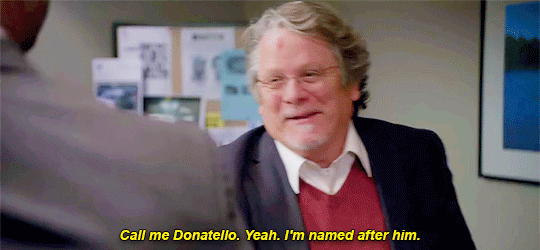
We meet Donatello this season too. Wonder how long this guy’s gonna last :/
Lol he said - ”but I’m an atheist” - like that fucking matters please! Then when he meets Chuck, he gets all nervous and starstruck. Way to stick to your non beliefs lol. I get he got concrete proof but no pushback at all? Chuck’s response - I believe in ME. He ain’t sweating nothing, as the real God wouldn’t!
Amara torturing the devil - HA! As far as I’m concerned he got off easy. So did Crowley for that matter but then again - if this show had been on HBO they would’ve been as brutal as GoT - I don’t even wanna imagine so we’ll just move on.
Chuck found Dean’s porn stash - wonder what specifically he had on there 😏
Moving on!
Metatron died!!!!!!!! Finally!!!!!! Huzzah!!!!!!!!! Woooooooo! I’m just surprised he decided to sacrifice himself I mean really?!?!?!?! He was always so slimey and self-serving/preserving. It was odd but anything to get rid of him I guess 🤷🏽♀️
Also - this is God’s sister we’re talking about - she is his equal. One depowered former angel ain’t gonna do shit against her. The combined smiting power of all remaining angels of heaven couldn’t even hurt her. I mean are you joking?
He died as he lived - a troll.
What an interesting little chapter God has written for himself here cuz I don’t believe for a second he was ever in any danger. Chuck is just a role he’s playing and he returned to the fold cuz of the fallout from Dean losing the mark of Cain. I think he enjoys being Chuck so he can shirk the responsibility of being Him. Everyone wants him to help, to be there, to be this benevolence that Chuck doesn’t feel he’s beholden to be.
Anyway - the Winchesters & Chuck amass a strike force - but in retrospect did any of them believe it was gonna work - I mean. Originally I think they said God and his archangels - Michael, Lucifer, Raphael AND Gabriel worked together to take Amara down. But they only have one archangel - what the fuck happened to Michael they should’ve brought him back - Luci’s in Cas so Cas can’t do anything but bring in the angels for support - Crowley, Rowena, the only thing they excel out is outliving the Winchesters’ friends tbh - and chuck who didn’t really do anything - I mean talk about delegating XD
All that effort - angels AND demons and while they did some damage to Amara - gotta build up some endurance girl! - and all that was done was fuck up her makeup. What was that staff by the way - that actually managed to hurt her but when presented with the prospect of being sealed away again, girl was NOT having it! She tried to kill God right there!
And sam was gonna take on the mark of Cain, really?!?!?!?!?!? The hell?!?!?!?!?! Chuck you ain’t slick. He wants the brothers to kill each other - really makes me wonder how many sets of brothers were subject to this aside from the Winchesters and Cain & Abel. I know I said that in my season 10 recap but still!!!!
Lol when the Winchesters said they’d respect each other’s choices to sacrifice themselves - ahahahahahahahahahahahahahaha - what a load of crap!
Cas got freed of the devil - so yay? Dean is relieved to get his angel back. But he goes on to bro-zone him. Not even friend zoned but bro-zoned OML 😂😂😂😂😂😂
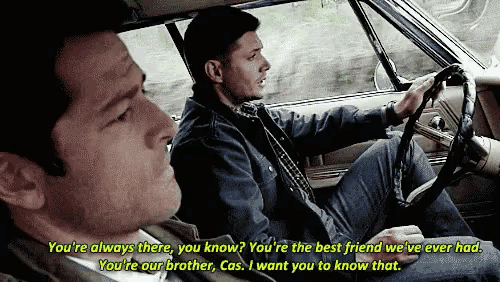
And of course when the shitty plan to defeat their big bad antagonist goes tits up, the only natural response is - TO DRINK!! Lol Rowena cuddling up to God - funny considering those actors are together nowadays.
The men of letters - not gonna bring them up - I don’t give a shit 😂😂😂😂😂😂😂 clearly they’re gonna be an unwelcome addition to season 12
With some further brainstorming they deduce that a) Amara can be killed with a mega soul bomb, making me think about b) dragon ball Z when Goku would use the spirit bomb (not exactly the same but I find it similar) but c) that’s kinda fucked up - what happens to all those souls???? I didn’t care for that at all.
Since Dean is the one with the ‘profound bond’ (what else am I gonna call it?) with Amara, Dean’s gonna get the bomb put inside him so he can kamikaze himself along with Amara.
And what would’ve happened to Dean then? Go to heaven? I guess we’ll never know.
Dean’s Rowena imitation 🤣🤣🤣🤣🤣🤣🤣🤣🤣🤣🤣🤣🤣🤣🤣
The fact that Cas wanted to go with Dean 🥺
How Dean smiled in the angel’s embrace.

At the end of the day though, all that was needed to save the day was a calm family discussion between bro and sis, with Chuck and Amara disappearing into (where did they go?!??!?!?!) somewhere…….cuz Amara just changed her mind. Okay….

But finally - Mommy’s back

Yaaaaaaaaaaaaaaaay??????????
Dean was shooketh. This would’ve also been an interesting opportunity to bring back John. And ADAM!!!!!!!!!
Why stop at mom, bring back the whole fam for a long season of dramatic family drama, have Supernatural go full soap ahahahahahahahahahahaha.
Wow I had a lot to say about this season - didn’t plan on that but only 4 more seasons after this. What a ride its been so far.
#supernatural#supernatural season 11#dean winchester#sam winchester#castiel#destiel#deancas#rowena macleod#crowley#chuck shurley#amara supernatural#mary comes back
3 notes
·
View notes
Note
What do you think about elves only falling in love (being able to) once over their whole entire lives? I thought that was canon but now I’m like 🧍♀️ maybe not 😭
LaCE discourse ahead, proceed with caution!!!
Laws and Customs of the Eldar, an essay in Morgoth's Ring (the 12th book of The History of Middle Earth) gives us the most information about marriage between the Eldar (which does NOT include the Silvan*) and that information is lacking at best. All it tells us about elves falling in love is that they marry only once in their lives and that for the most part, marriage is entered out of love rather than duty. "It was the act of bodily union [sex] that achieved marriage" is what Tolkien tells us.
However, it's always important, even in fiction, to consider the source information comes from - it's talking about the laws and customs, rather than the inherent nature of the Eldar. Given Tolkien's Catholic background, it can solidly be interpreted that the Eldar believed sex was an act between two married people, and so if two unmarried people had sex, that meant they were married. Remember, laws and customs can be broken.
I bring sex into it because much of the passage about Eldar marriage alludes to it. Of course, that then raises the issue of marriage without sex not truly being marriage, but that's not the case at all. Then there's also the question of what do the Eldar define as sex? The conservative answer is pretty well known, but we here at ellrond.tumblr.gov know better than that.
This small passage's reliability is somewhat undermined by the existence of Finwe's second marriage. He entered into his marriage with Indis (mother of Fingolfin and Finarfin) out of love and desire to have more children. He deeply loved both of his wives (he stayed by Miriel's side while she walked the line between life and death, and then had thousands of happy years with Indis) which indicates that yes, the Eldar can be in love more than once. The counter-argument could be that Finwe was a special case because it was known that Miriel would never take physical form again, and the hostility that Feanor had for Indis and her children ultimately led to the darkening of Valinor, the Doom of Feanor, the kinslayings, the rebellions, and the War of Wrath (to name but a few events). Perhaps it was seeing the fallout of an elf remarrying that led to the Eldar saying that they could not marry more than once?
In Tolkien's world, love usually leads to marriage as far as we know because he was the product of his time and environment. Even in the early-mid 20th century, he was socially conservative and his portrayal of love and sex, and marriage reflects this. However, there is enough wiggle room within his texts for readers to interpret them liberally. Personally, I believe that the Eldar could fall in love more than once, that they could have sex without being married, that they could be married without having sex, and whatever else. To me, it seems reductive and almost lazy to say otherwise, it is refusing to acknowledge some complexities that the Eldar would be capable of, as seen in other aspects of their long lives.
TLDR: if you want elves to fall in love more than once, there's strong enough arguments to support that idea to be found within canon, go wild!!!!
If you'd like to read LaCE yourself, you can find it here! There's lots of cool info on marriage, on elf kids, death, those affected by the Doom, healers vs warriors etc!
*Silvan elves (like Tauriel, Arondir, and Haldir) aren't bound by these laws and customs.
#anon#ask#laws and customs of the eldar#discourse#sex cw ///////#tolkien said and they lived happily ever after and we said OH IS THAT SO
8 notes
·
View notes
Text
the web
I can’t remember it exactly, but I think we were questioning reality, when “sub-creation” came up in conversation. It was introduced as a concept from J.R.R. Tolkien and in the context of plant consciousness-- two realms that, to me, seem somewhat impenetrable for different reasons. Partially because of ignorance, but also partially because I think there is a limit to how far you can explore (1) the Tolkien universe or (2) the intelligence of other life forms before they get too trippy-- as in, you start projecting so much of yourself onto them that they become more like a broken mirror for your own stories.
but anyway...
Tolkien himself defines sub-creation as forming a cohesive fantasy through building worlds and creating myths. In the literary context of his “legendarium,” this refers to the idea that all of the creative endeavors of the Ainur, Elves, Dwarves, and Men in the world of Arda stem from Eru Ilúvatar, or “the One.” This is because Eru possesses the “Flame Imperishable”, granting him the ability to create existence from nothingness (shoutout to tolkiengateway.net....). So, Tolkien distinguishes between a sort of primary creation, the act of turning nothing into something, and subsequent creation, everything that happens afterward.

There is an obvious parallel here to the role of an author: a fictive writer is, indeed, the creator of an entire universe, and all the characters and actions taking place within that universe are derivatives of the author’s efforts.
But the author creates because they are created themselves. And indeed this aligns with Tolkien’s theology, as he was a devout Catholic and therefore believed that he was created by God. Thus, in his efforts as a writer, Tolkien embraced sub-creation as a form of worship, a way for creatures to express the divine image in them by becoming creators themselves. (David C. Downing. Sub-creation or Smuggled Theology)
So, is sub-creation only conceptually interesting for a religious fantasy writer? I think there are two main questions to be answered here, and I will try to loosely address them in this text. The first is: can the idea of sub-creation transcend theology? And the second is: can it offer a way to find meaning in the human experience?
....
And so we begin with Humanity’s Biggest and Baddest Question: “Who or what is our Eru?” or, in other words,
“How did we get here?”
The question that has started wars, divided people, been the greatest source of angst and/or bliss, the unanswerable question, the question that is somewhat miraculous even in its ability to be thought...
Is it indeed an old white man with a long beard and flowing robes, sitting upon a throne of sky and stars? or perhaps a cosmic turtle, carrying the world on its back? or maybe all life and matter are just the consequence of an extremely small and dense point exploding 13 billion years ago?
Is this question just an answerable case of infinite regress (the idea that everything that exists is contained within something else)
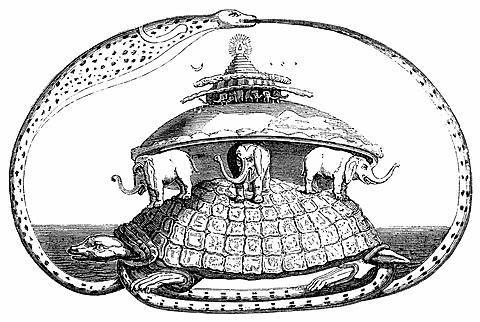
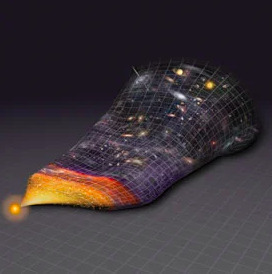
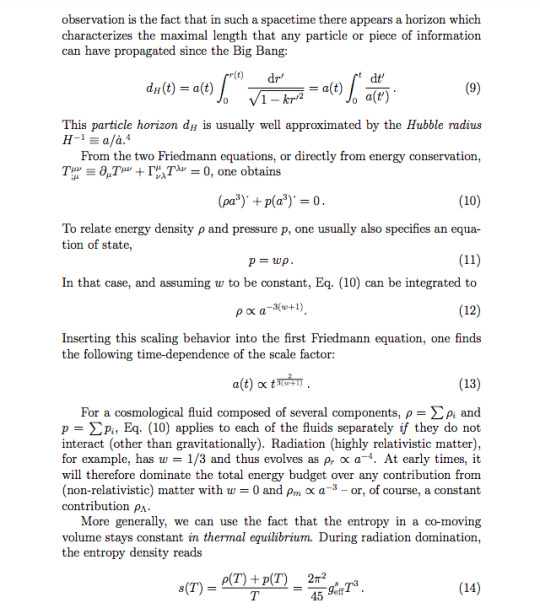
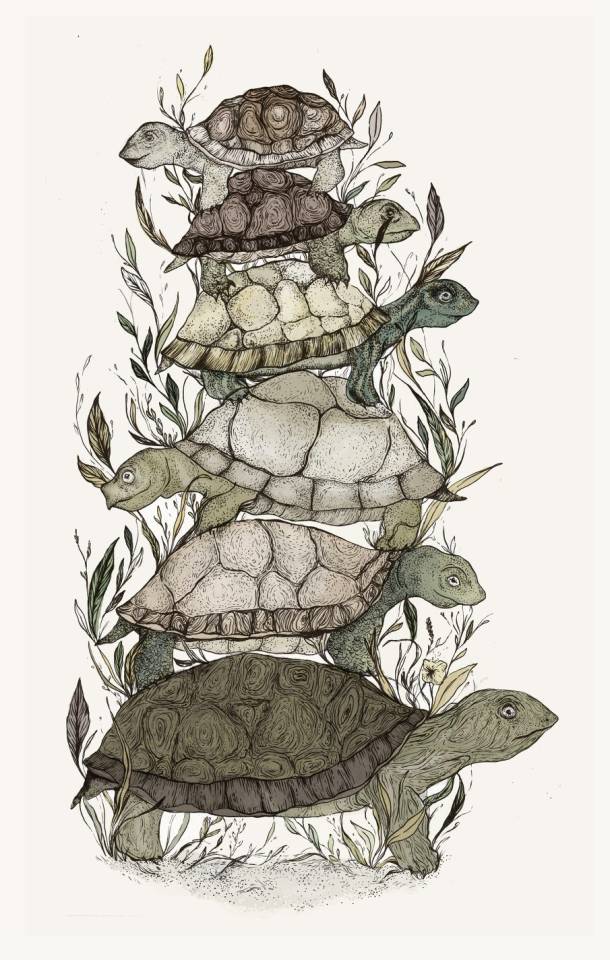
(Before I continue I feel like I need to make a disclaimer that I am quite ignorant when it comes to both philosophy and world religions. I make some big generalizations in the following musings, and I tried to combine what I already know with a little bit of research, but I will just try to humbly acknowledge here that I don’t really know what I’m talking about. But it’s kind of fun to be in that position. )
I was not raised religiously and I don’t align myself with any one faith or text or dogma (even you, science). But I do intuitively believe that material life is like a great drama, with many characters all playing their parts of mother, father, child, friend, enemy, sinner, saint, etc. I also believe in a “capital-C” Creator in some sense, or an original force of creation that is imbued in every atom vibrating in this universe. I feel that everything is alive, and communicating, and we humans are little mirrors of the greater Being (verb not noun), shining back small reflections of unfathomable greatness, pain, destruction, bliss, unity, difference, ecstasy...... something like a bigass disco ball. maybe the universe is just endlessly fractaling disco balls, and the supposed duality between “Creator” and “created” is irrelevant and there is no sub-creation, no succession at all; indeed, only creation. Maybe.
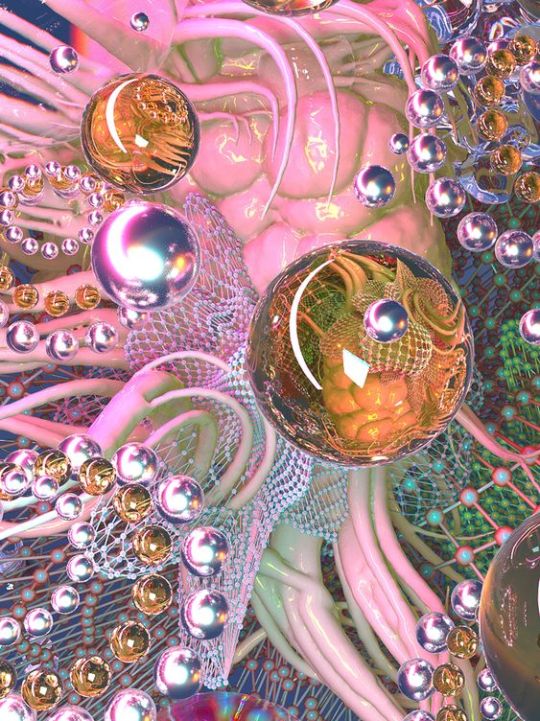
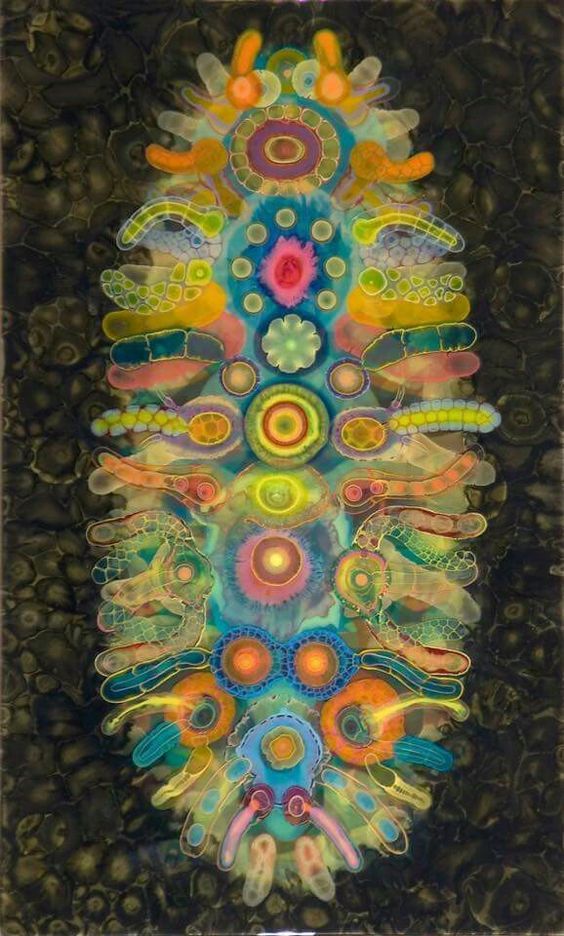
I could segue this entire essay into a discussion on non-duality as a philosophy and try to argue whether the idea of sub-creation aligns with or opposes it, but I won’t.
So I just take some and leave some from Tolkien’s concept.
As I understand it, Tolkien sees the primary creator (whether that be Eru or his Catholic God) as pure perfection, the vessel of all goodness, abundance, and vitality, and, as was already mentioned, the only one with the ability to make conjure existence out of nothing. Any subsequent creation, like man for example, will therefore never be able to replicate this complete perfection, but will instead “reflect a splintered fragment of the true light” (his words). And so, only by building worlds and creating myths can humans aspire to reveal/identify this light embedded in their own existence.
I think atheists and non-atheists alike can agree on this at least: that all sentient and non-sentient beings are a product of some sort of immaculate conception, whether that be the Big Bang, or the decree of Allah/God/Brahma/etc, or the hatching of a great egg.
But the agreement ends when it comes to whether or not this has an impact on human nature and the nature of all living things.
In Hinduism and Buddhism, for instance, human nature is seen as related to divine nature, and the main task for human beings is the overcome the perception of individuality and become part of All That Is. Taoism further emphasizes the importance of cultivating “chi,” or our life force, through living in harmony with nature in order to enter the kingdom of heaven and gain eternal life. In Semitic religions like Judaism and Islam, the Self is thought of as distinct from and dependent on the divine; therefore it is important to live in gratitude and obedience toward God. Any disobedience, or sin, is not necessarily rooted in human nature, but must be corrected. In early Christianity, humans are seen an embodied image of God, but one that requires the “continuous creative activity of God,” without which they would return to earth, or dust. ("Human Nature, Religious and Philosophical Aspects ." Encyclopedia of Science and Religion.) However, around the 4th century CE the Christian Doctrine of original sin emerged, which holds that humans are born corrupted by sin as a result of the fall of Adam, and that “wickedness is a property of the human heart” (“What is the Biblical Evidence for Original Sin?” desiringGod.org). Despite this, some denominations of Christians, like many Quakers, believe in the doctrine of “inward light,” which holds that God is in everyone and that humans are inherently good.
Very briefly I will just add that various philosophical and scientific trends throughout history have then added to/erased/replaced these understandings of the human condition. And along with them, there has also been evolving understanding of the nature of the non-human world, sentient or otherwise. Some beliefs hold that humans are irrevocably superior to all else because they contain a soul, which others may extend the concept of a soul to some or all of the non-human world. A 2011 study investigated whether different cultural and religious groups were more likely to ascribe personhood to non-human entities such as fire, angels, robots, bears, dogs, fetuses, and deceased humans. It found that while American Indians were likely to think of fire, bears, and fetuses as persons, Atheists were likely to say that robots and dogs were persons, but fetuses and angels were not (Adam Cohen. 2011. Religion, Culture, and the Personification of Non-human Entities.)
This is all just to say that there are many different answers to the question of how we got here, and what implications it has for our existence. And I think answering the how begins to illuminate the answer to the why? why are we here, why do we have a consciousness that allows us to contemplate mysteries such as these? why do we have a world that looks the way it does, with all of its suffering and beauty, diversity and connectedness?
I want to spend some time with the ideas of world-building and myth-creating as ways to understand our collective reality, but simplify them even more to structure and story (partially just for the alliteration). I think you can look at just about anything through the lens of structure/story, and they are inextricably linked; a real chicken-or-egg situation...
*it’s the figures and tales we have projected onto the configurations of stars in the night sky: the bull, the water bearer, the great bear, and so on
*it’s the prison walls that hide away what a particular society cannot tolerate, whether that is acts of cruelty, taboos, people of a certain race....
*it's the Ganges river, full of bodies that are not even entirely cremated because there are too many other bodies piled up on the shore, waiting for their rite of passage
*it’s the bathroom stall, scribbled over with tags, political slogans, and love notes
*it’s the bed where, under the covers, the first “I love you” is tentatively whispered
It's the bathhouse, grandma’s kitchen, the office elevator, the playground, the parliament chamber, the country borderline, it’s a deserted island, it’s Hong Kong, it’s the cup you always use, it's the photo you can’t look at anymore, the small mementos you carry around with you from place to place.......
It’s peace, war, reconciliation, fear, inspiration, justice, play, nostalgia.......
When I think about structure more, I see it, in its most reductionist form, composed of bonds and spaces///matter and void. Take soil as an example. In Regenesis, George Monbiot explains a recent “Theory of Soil” proposed by scientists in 2020, which is essentially that soil is composed of “structures within structures within structures” (23). tiny particles are stuck together with carbon-based polymers, or cements, that microbes excrete; as creatures of all sizes (earthworms, fungi, bacteria, mites, etc.) colonize and move through/establish themselves in the soil, they create holes of different sizes, into which water and chemicals released by plants and animals can flow. This complexity is multiplied by time, as more and different species wriggle their little bodies around, and the result ends up being, in Monbiot’s words, an “endlessly ramifying catacomb” (24). The most interesting part, to me, about Monbiot's musings on soil, is when he mentions fractal scaling, and says that the structure of soil is consistent at any scale of magnification.
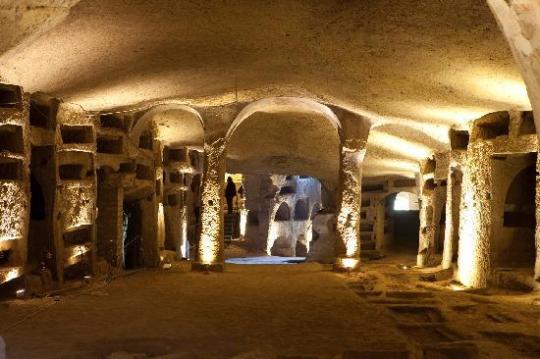
Fractal scaling and this image of a complex, growing catacomb makes me immediately think of bread dough and models of the universe. In the words of Seamus Blackley: “rising dough is actually a pretty good analogy for the expansion of the universe; every little bit of flour in the dough is getting farther away simultaneously from every other bit of flour all at the same time. This is what the universe seems to do. Weird huh?” (Twitter)
There is also a popular analogy in cosmology that compares the way that galaxies move in our expanding universe to the way that raisins move in a rising loaf of raisin bread.
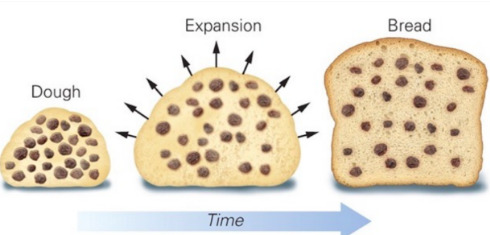
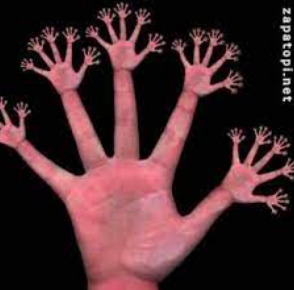
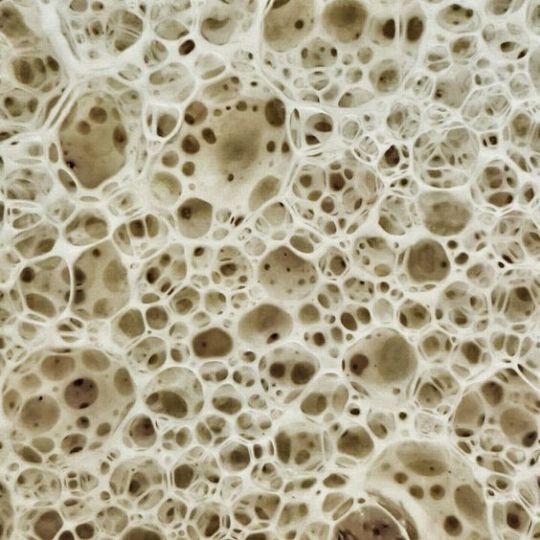
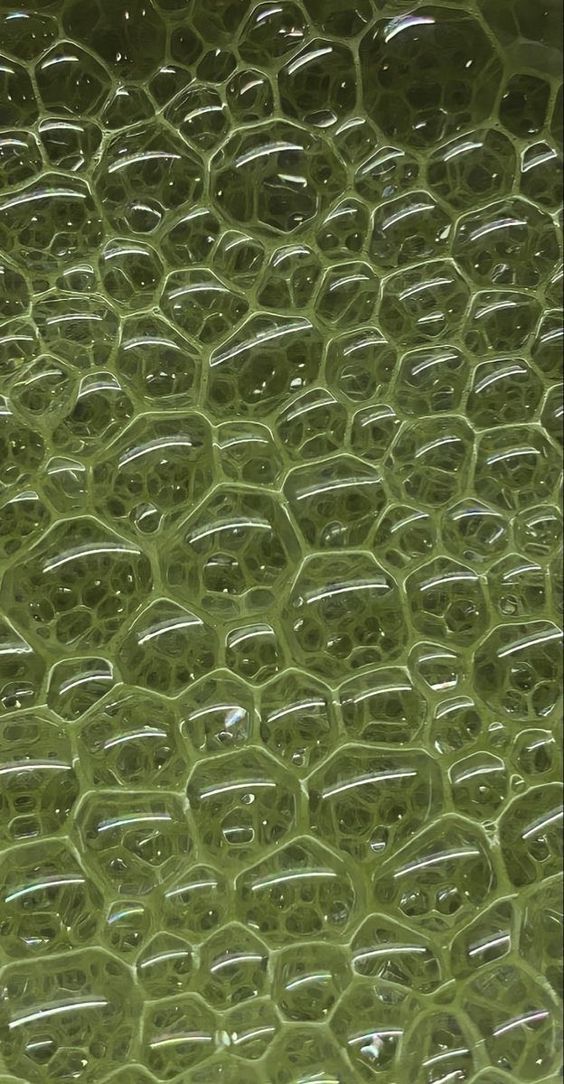
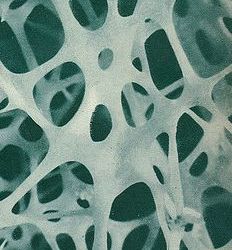
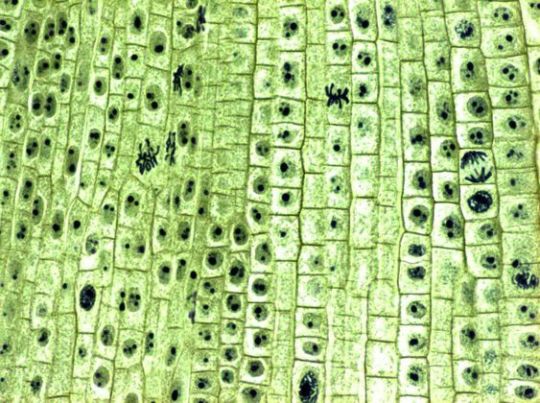
when I think about stories, the first things that come to mind are obviously religions, folklore, myths.....etc. In some ways, these are like structures because they are also bonds and spaces, in the sense that stories are merely people/places/ideas plucked out of the infinite imagination and woven together like tapestries. Different cultures have different conceptions of what a story is, and the acceptable amount of deviation from logic or temporal/spatial linearity can vary. But what is consistent is that stories change and evolve.
Take the environmental movement in the US, for example.
It is an amalgam of stories driven by religion, racism, ethics, profit, science and so on, and serves as an illuminating example of the inseparability of knowledge and power. (Like Foucault says, society’s dominant narratives are always embedded in power relations, and how consequently, those with the upper hand will have more say in what ideas and stories, or discourses, become mainstream.)
One specific story that we can explore further is the construction of wilderness and the “pristine myth” in North America. Influenced by biblical doctrine, early Europeans equated wilderness with the unknown and saw it as something to be feared; but by the time the first colonists invaded the Americas, wilderness had been ideologically transformed into something representing bountiful resources and requiring human stewardship. Colonizers dehumanized the indigenous peoples of North America and trivialized their relationship with the land, as they believed that “forests were wild because Indians and beasts lived there, and Indians were wild because they lived in the forests” (Hopson, 2011). This provided justification both for interfering with the physical landscape and driving indigenous people out of their territories.
However, in the middle of the 19th century, on the edge of the civil war and in a period of cultural insecurity, Americans began to revere wilderness as a symbol of moral purity and stability. There had also been years of rampant destruction of nature through logging and hunting, and people were beginning to see the negative effects of this. This laid the foundation for the transcendental cultural movement that later inspired John Muir who, along with Teddy Roosevelt, sequestered millions of acres of land to create the first national parks, Yellowstone and Yosemite. Doing so, though, required the forcible removal and exclusion of the land’s native inhabitants. These were people who had cultural and spiritual ties with the land and who, contrary to the narrative of the “Noble Savage Myth,” had been altering the landscapes for hundreds of years through slash-and-burn cultivation, hunting, etc. The persisting myth of wilderness in North America, codified in the 1964 Wilderness Act, has consequently excluded indigenous people from land in order to preserve it for the recreation of others (i.e. white middle-class people, whom the parks were created for in the first place), and has become the ideological foundation of American conservation efforts both domestic and abroad.
Therefore, it is crucial to question and interrogate our own stances, the narratives we buy into and perpetuate on a daily basis, and consider what new stories can be told in order to create a more equitable, just world.
Now, maybe a lot of what I have written so far is a bit disjointed and hard to follow. Maybe you’re asking “where is this all going?” (I have asked myself the same question several times throughout the writing process, that’s for sure).
But to me, all this talk about religion and human nature and structure and story comes back to the fact that I think, as humans, we are all trying to find a glimmer of purpose in this life. Regardless of whether you think there is no objective reality and we all live in a simulation of some sort, or that we are splinters of a very tangible divinity, or the product of a funny little physics experiment, we were all granted the ability to ponder each of these possibilities and align ourselves with one that fits our view of the world. This is a gift and a curse, and up to us what we do with it.
And if we really look around us, at all the other species we share this planet with, at the clouds and stars above us, and the leaves falling down around us, we see that movement, change, growth and decay are the universal truths. Even mountains, seemingly immutable giants, are dancing -- they just dance on a different time scale than us. To the mountain, we are like small ephemeral insects, zooming around at a sped-up pace, growing, fucking, reproducing, and dying.
And here, on the farm, we are trying to create a little microcosm of life. We try to observe and interact with nature as our great Teacher, and practices like permaculture and biodynamics can offer a methodology for doing so. Where possible, we use the gifts of the land-- from seaweed to sand to green material and wild edibles. We try to understand the structures all around us (soil, plant morphology, water systems, microclimates, etc.), and try to chip away at some of the most harmful stories in agriculture (yield and profit > quality of produce and health of land, etc.) and build up new, beautiful ones. While farming fundamentally requires us to manipulate land for our benefit (growing food and other crops), it also gives us an opportunity to maximize its potential for providing habitats to other species, collecting rainwater, storing carbon, and overall becoming more diverse. And diversity offers resilience, especially as we face unprecedented times ahead.
Leaving a piece of land better than I found it is enough to let me lie easy on my deathbed.
We are immersed in the ebbing tide of Life and Death and Life and Death and Life again. Transformation. Alchemy. The story of resurrection. If God or Creator is imbued in every living and non-living being, if even just as a splintered fragment of light, then connecting with as many of these as possible gives us ample opportunities to see this light and get to know God/Creator/Source/etc. better. There is magic in each and every one of them, in the niches they occupy, and in the greater systems they are a part of. And then we realize that it’s all one massive beautiful web, and us humans are just one shining dewdrop upon it.
References
“The Subcreation Theory of J.R.R. Tolkien” https://gwern.net/doc/fiction/science-fiction/2015-mirante-thesubcreationtheoryofjrrtolkien.html
“Regenesis” by George Monbiot, 2022.
“Human Nature, Religious and Philosophical Aspects” https://www.encyclopedia.com/education/encyclopedias-almanacs-transcripts-and-maps/human-nature-religious-and-philosophical-aspects
“What is the Biblical Evidence for Original Sin?” https://www.desiringgod.org/articles/what-is-the-biblical-evidence-for-original-sin
María Del Rincón Yohn (2021) J.R.R. Tolkien’s sub-creation theory: literary creativity as participation in the divine creation, Church, Communication and Culture, 6:1, 17-33, DOI: 10.1080/23753234.2021.1886860
1 note
·
View note
Photo

Thanks, great question! I don’t react all that viscerally to fictional prose these days. I also agree with Lovecraft when he writes in Supernatural Horror in Literature about how true horror requires a metaphysical dimension, what he calls “cosmic horror.” This disqualifies from the truly frightening merely human evil unless connected with this horror-from-beyond. For this reason, I’d separate “most frightening,” which for me implies Lovecraft’s stricture, from “most disturbing,” which can be more purely material or human-scale. A few answers, then:
When I was a child, around 11 or 12, the most frightening book was definitely The Exorcist, which I read in one day and then didn’t want to have in the same room with me: my dad’s old crack-spined purple paperback movie tie-in edition from the ’70s with the hardcover’s out-of-focus demon-girl face on the front bisected by a banner with some boasts about the film.
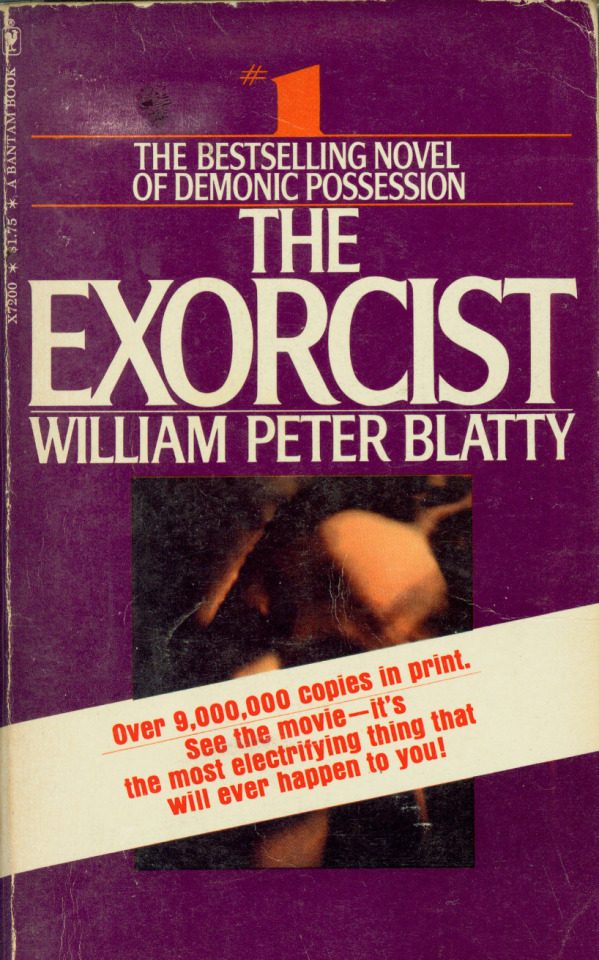
I found the book almost more frightening than the movie (which I’d seen in a TV-redacted version when my age was in the single digits) because more detailed and portentous. From the tortured epigraphs forward, the last three words on the epigraph page being “Dachau Auschwitz Buchenwald,” the whole modern world seems possessed as far as Blatty was concerned. Obviously the movie is the superior work of art and the novel in fact practically a screenplay. James Baldwin’s quip, “I forced myself to read The Exorcist—a difficult matter, since it is not written,” is fair. But these aesthetic niceties didn’t comfort me in childhood. Whether the novel will have the same effect on adults not raised Catholic, I’m not sure.
Since I brought it up, I find James Baldwin’s aforementioned celebrated critique of the movie a bit small-minded. His hostile plot summary is admittedly very funny, but a skilled writer can do that to any narrative. And especially insofar as Baldwin’s denunciation also encompasses Ken Russell’s The Devils, I detect an iconoclastic Protestant dislike of Catholic phantasmagoria beneath the political bluster of the essay’s peroration, which just amounts to the usual leftist admonition that art must be about social injustice. To give Baldwin his due, though, this sentence is justly immortal:
For, I have seen the devil, by day and by night, and have seen him in you and in me: in the eyes of the cop and the sheriff and the deputy, the landlord, the housewife, the football player: in the eyes of some junkies, the eyes of some preachers, the eyes of some governors, presidents, wardens, in the eyes of some orphans, and in the eyes of my father, and in my mirror.
But I digress. The most unsettling thing I ever read in a novel as an adult must be the central narrative, “The Navidson Record,” in Mark Z. Danielewski’s House of Leaves. The rest of the book isn’t that good, as I complain in this review written in a comic vein. But Danielewski’s vertiginous pit-of-the-stomach play with the invasion of cosmic scale into private life recalls Borges, whose own stories, come to think of it, don’t get enough credit for creating a real frisson of metaphysical terror.
Now for “disturbing,” I’m afraid I have to take leave of prose, which just doesn’t cut that deeply for me (I’ve been behind the curtain, as it were). As I recalled in my essay on the graphic novel From Hell, the first time I read the chapter where William Gull spends 30 pages dismembering Mary Kelly (or some other woman in her stead) as relevant mythical archetypes and architectural motifs flicker at the edge of his awareness, I literally threw the book down in admiring revulsion. I felt Moore and Campbell had genuinely conveyed a certain kind of extreme consciousness or fugue state that disquietingly fused aesthetic achievement, political power, mystical experience, and misogynist murder into one and the same event—not how I’d choose to look at things, but useful knowledge insofar as it is how some other influential people do so choose.
From Hell is also a work saturated in conspiracy theory, and this is the other type of reading, often online, often purportedly but disputably nonfictional, that actually disturbs me, for all its flights of fancy, for all its grains of truth. I still remember when I discovered the Rigorous Intuition blog in the early 2000s. Its counterintuitive mix of leftism with Satanic Panic—I would at that time have dismissed the latter without the former—had me afraid to leave the apartment lest Michael Aquino in his black robe (say, how am I connected to Michael Aquino?) was going to jump me in an alley. A half-silly notion—only half, though, as I do agree with Baldwin that there must be something evil, if we may call anything evil, in many if not most of the principalities and powers that be.
#horror#horror fiction#william peter blatty#james baldwin#mark z. danielewski#alan moore#eddie campbell
0 notes
Text
Every time I see someone complain about the wealth of monologues in Midnight Mass, I just want to shake them and whisper, “It is a direct reference to Catholic homilies. It is. It is a direct reflection of the heart of a Catholic sermon.” Every character is granted the ability, regardless of what they believe, to offer the audience their own sermon. Science. Experience with abuse or addiction or bigotry. Hopes for the future. Forgiveness. Every character is given the chance to reflect back to the audience, via a homily, the heart of what’s going on in their world.
It is intentional, y’all.
#midnight mass#midnight mass spoilers#if you’re not a character-centric person I get finding it slow#but every time I see a tweet or a complaint about it being ‘all speeches’ I just want to be like#yes! yes it is! because it’s a character driven piece set against the backdrop of CATHOLIC MASS#Flanagan loves his monologues. there’s no denying that. and it works for me in any context.#but ESPECIALLY in this show#because a well-deployed monologue is not about the character speaking#it’s about showing the importance of people listening to each other#and the Catholic homily is very much ‘here. you’ve got the basics now let’s digest what it means for the human side’#I’m as far from Catholic as they come but I was raised in this world and seeing Flanagan use it to round out this cast was so smart#and I’m so. annoyed. every time someone just goes ‘yeah I tuned out of all the talking’#the talking is the point! the community is the point! digest the story and apply it! that’s the whole thing!#Flanagan’s core theme of character is always that the most important thing we can do for each other is listen#which is why bev is so fucking maddening as a character—she is forever cutting other people off to talk over them#yeah the evangelical cruelty of her is the worst but we see it most often in her refusal to sit down and listen#vs Riley and Erin and all the rest of these people being so willing to just. take in other people’s stories and perspectives and pain.#it’s just so cleverly deployed in such a slow-burn fashion#it is so. so intentional as framing.
749 notes
·
View notes
Text
LGBTQ Light Novel Review – I'm in Love with the Villainess Vol. 2
A Defining and Relentlessly Queer Work in the Next Era of Yuri
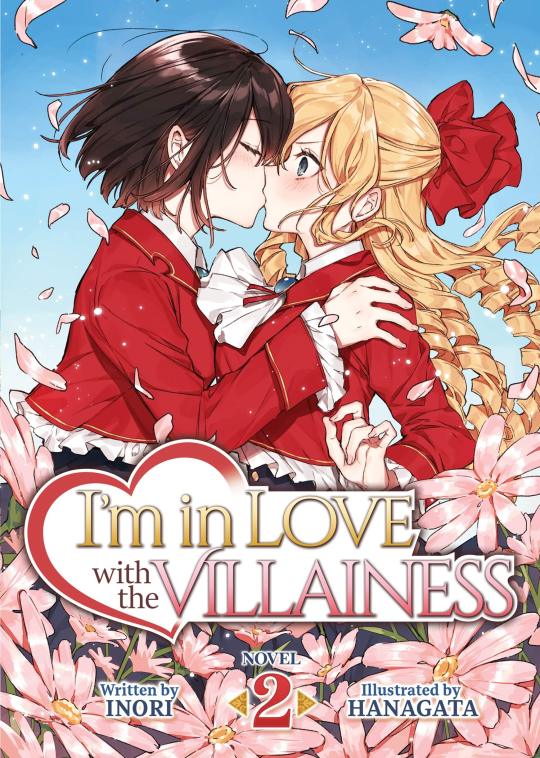
I have backed myself into a corner and see no way out of it. For I have already awarded Inori's I'm in Love with the Villainess a perfect 10/10 score for its stellar first outing. And then, upon seeing what Inori did in the second book, I regret my choice because I have no way to raise the bar on perfection as Inori did in her light novel. Indeed, it has taken me far too long to write this review. My mind is thoroughly exhausted after pondering what I read and accepting the honest truth: that that may very well become a defining work in the next generation of Yuri. For as much time as I spend diving into the Sapphic news of the day, I devote even more to looking to the next big movement of Yuri. If I'm in Love with the Villainess Vol. 2 is a signal of what Yuri's future holds, then we are entering an extraordinary queer era.
The story takes off shortly after the first book. At least for the moment, the commoner revolt is quelled, and Rae continues schooling alongside her beloved Claire. Storylines include a new transfer student rivaling Rae for Claire's affection and the girls going on vacation to visit their families. However, the story takes a pretty dramatic and welcome turn halfway through the book. Through a combination of luck and her expect negotiation tactics, a fruit of her intimate knowledge of Revolution's world and inhabitants, Rae is tasked with investigating corrupt nobles. This change allows Inori to take the world and characters further than in the previous book. While the first volume did an excellent job establishing the world inside the school, this entry ventures beyond the academy's borders into international relationships, the church's role and goals, and the dealings of various factions and political parties. It is appropriate progression and one that lends to the story's main arc well.
While all of these events occur, Rae continues her mission of protecting Claire from the inevitable new order. By the time the finale rolls around, it is so immensely satisfying to see all of her plans and strategies pay off. It carefully balances rewarding the reader's attention and keeping them engaged with new twists and revelations. As the story develops, Claire is exposed to more of the reality of common life through Rae and comes to appreciate her privilege and understand the realities of socioeconomic inequality, evolving from the arrogant young woman we initially met. This path has two effects on the story; first, it allows Inori to explore real-world economic disparity issues while still worldbuilding. Second, it ultimately continues the story of Rae's plan, as she wants Claire to be in the commoner's good graces.
These elements make for a fantastic story in a rich, developed fantasy world. However, I adore I'm in Love with the VIllainess not for its intricate magic system but because of the phenomenal LGBTQ+ representation. I was floored by a frank, open, and wonderfully thoughtful discussion of queer representation in the first volume. Few, if any, Yuri works have done anything similar, and it was honestly an inspiration for me, so much so that I awarded it a perfect score almost solely for that passage. However, Inori once again usurps her own throne, taking this forthright and deliberate queer content and turning it up to eleven!
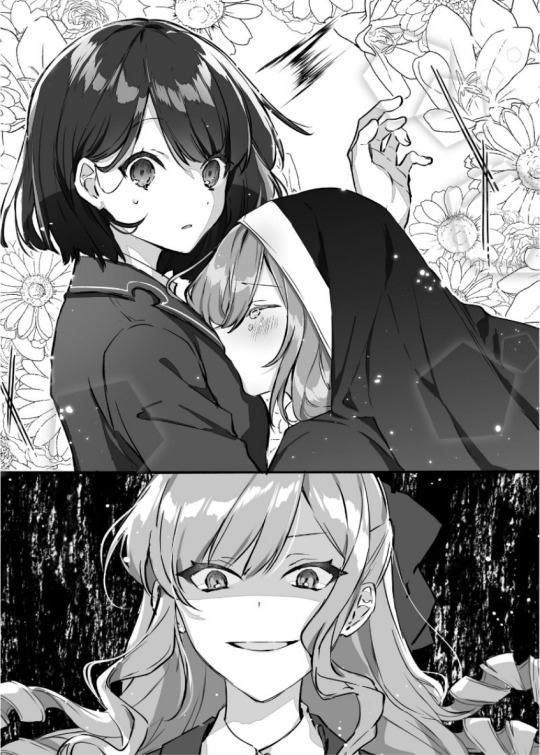
It is almost easier to count the number of main characters not confirmed as members of the LGBTQ community. Figures big and small have their identities explored and revealed during this novel. Some began believing themselves to be straight and exploring their sexuality further. In contrast, others are comforted by Rae's fierce, outspoken, and brazen support and pride in her identity to come forward. One particular scene that comes to mind is when she scolds a pair of nuns for using religion to justify their homophobia. This moment was particularly satisfying to return to after the Catholic Church's recent disavowing of same-sex marriage.
The series even has a character struggling with gender dysphoria who is liberated from society's expectations thanks to a rather ingenious plan of Rae's and her friends, new and old. While not exactly an example of authentic transgender representation as we consider it, as the character's struggles with gender result from a magical curse, but the parallel is clear. Speaking of reality though, the volume grants some glimpses into Ohashi Rei's life, the woman that would one day wake up as Rae.
Rae's experiences with LGBTQ+ identity, set in the real world, are powerful and pull few punches. It is perhaps here that Inori gets most honest and tragic, as Rae painfully describing the ostracization and suffering faced by queer people, culminating in a trans man's suicide (the author thankfully does not describe the actual death). However, Inori balances this pain with the thrill and joy of discovery and accepting oneself, and finding kinship. It is writing that could only come from an author who had experienced these feelings herself, and they will be immediately understood and have a visceral effect on queer readers. I love these moments so much for their vulnerability and relatability. But my favorite part has to be the ending (skip to the final paragraph if you want to avoid spoilers and somehow have not seen the cover of Volume 3).
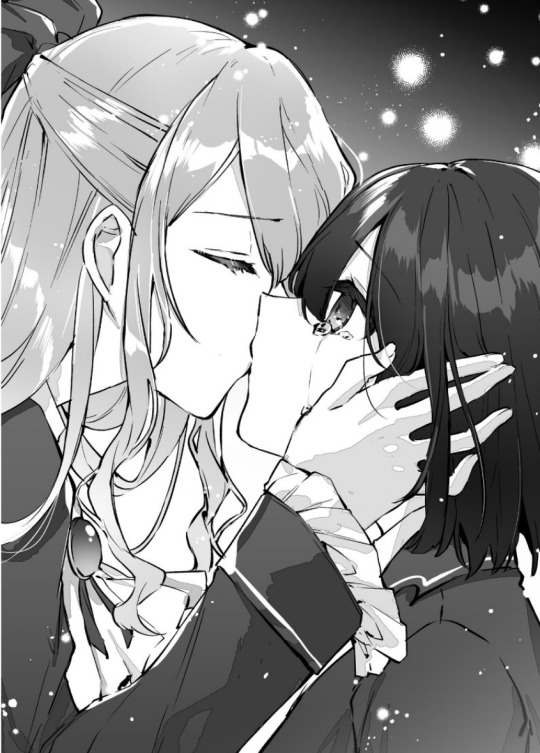
We finally come to the big queer happy homosexual ending, which is also gay, and my great Yuri goddess, it is perfect! After wading through a revolution and enough surprise revelation to last a lifetime, Claire and Rae settle down into their new life together. Although they cannot legally get married, despite their best efforts, they are absolutely wives. Their families support them, they love each other, and they even have kids! Yes, this unexpected and blissful development, the final gift of this volume, comes in the form of adopted children May and Aleah.
As I exclaimed upon the reveal of Vol. 3's cover, which features the mothers and children, "WE DID IT!! YURI FAMILY!! In Yuri, there are virtually NO stories about queer women raising a family with children together. It is a long dream of mine, the YuriMother, to promote such stories. To have one of the most profound and explicitly queer Yuri stories end in such a happy and new way brought me to happy tears. Except, this is not the end! There are two more volumes beyond this one that continue the story of Claire, Rae, and their children! There is even a very sweet and wonderfully sappy, tear-jerking, bonus chapter of the mother's bonding with the children and helping them recover from their traumatic past. And even become TEACHERS; I could just die happy in this Yuri paradise!
'We need to show we are prepared to live happily ever after, as a family of four. So, I swear to God: I will always love May, Aleah, and Rae.' When Claire said this, she broke out into a tremendous smile and I found myself once more overflowing with love for her. I held her close without saying anything.
Inori's I'm in Love with the Villainess Vol. 2 is precisely what an excellent sequel should be and everything I have ever wanted from a Yuri story. It appropriately raised the stakes in every way, expanding the world, flushing out its many factions and conflicts, and setting a new bar for queer representation and discussion in Yuri. Everything Inori writes feels so perfectly slotted together. Each set piece adds to the character development; each queer issue and identity showcased helps build towards the satisfying and exceptionally gay finale. It is a superlative weaving and integration of the priceless artifacts into an absolute masterclass of LGBTQ+ storytelling. I suspect that this is one of the opening works in Yuri's next era, and I cannot wait to see what follows.
Ratings:
Story – 10
Characters – 10
Art – 4
LGBTQ – 10
Sexual Content – 2
Final – 10
Check out I'm in Love with the Villainess Vol. 2 digitally and in paperback today: https://amzn.to/39gE664
Review copy provided by Seven Seas Entertainment
My sincere thanks to Jenn Yamazaki, Nibedita Sen, E.M. Candon, and the rest of the team at Seven Seas Entertainment for translating and adapting this light novel.
#Reviews#yuri#anime#manga#books#literature#lgbt#lgbtq#lgbtq+#queer#gay#lesbian#lesbians#girls love#gl#wlw#trans
373 notes
·
View notes
Text
As someone who was raised both Catholic and Evangelical (long story), you can see from a mile away when a non-religious writer tries to write a *religious* character or setting and has no idea how religion or belief works. For example:
A character is supposedly religious, but when faced when extreme distress, tragedy, or danger, they never pray, not once.
Similary, they are never thankful to God (or their respective beliefs) when good things happen to them.
In fact, they don't mention God at all. Which is even weirder with religious beliefs that unlike Christianity, don't have a taboo of "taking the Lord's name in vain" and who invoke God all the time in daily life.
The Church Is Evil. Which, yeah, of course I can see where it comes from. But what I mean by are the setting portray The Church as an institution where everybody is forced into it, nobody really is faithful or wishes to serve God or their religion, nobody goes willingly...
Similarly, no mention whatsoever of the spiritual or emotional component of religion. It's all about The Church as an institution. Peasants don't REALLY believe in God, silly! They go to church because the nobles tell them to!
That goes with that smug little aura of "oh, they don't REALLY believe this don't they like, it's all made up anyways and even they know it". Evil believer characters are of course shown as evil and use religion for power. Good believer characters are a little misguided, they believe in this silly stuff haha! but they're still good, even if dumb lol.
I can't quite explain it, but it's just the feeling of some authors going, especiallly on fantasy settings: "oh of course everybody went to church back then because they were oppressed and dumb, and I have to write an equivalent for it I guess, but they didn't really believe on that stuff, they were just forced on it, not like me, who I am smart, like my characters."
(Yes, I'm looking directly at GRRM. Also, 90% of horror movies.)
On the other side of the spectrum, believer characters who follow All The Rules. Everybody knows that for good or ill, most religious people don't follow every single of their beliefs; some bend to their own personal desires, others don't follow the rules they disagree with or have their personal reasons to do things differently, and some just forget or don't care, but they still believe.
When there's a single monolithic way to believe, both in real life and fantasy settings. I come from Latin America, and there could be whole encyclopedias written about the syncretism of the Catholic Church with native beliefs here. People believe in God, Jesus, and pay homage to Andean dieties like Inti and the Pachamama (associated with the Virgin Mary), spirits and curanderos (which some evangelicals consider witchcraft, despite most curanderos telling you their power comes from God first and foremost), and see no contradiction whatsoever.
By that same token, witch hunting as portrayed in fiction is often based in the Salem Trials, which ocurred in 1692, far, far from the Middle Ages and in the extremely fundamentalist Puritan Colonial US. "Witchcraft" and spiritism have been coeexisting, if uneasily, with exclusive monotheist religions all over the world for millenia, yes, even in medieval Europe; the puritan take on it is far from the only or the mainstream position on it.
Let's not forget all the different denominations and theological debates present in every religion. Just take a small look at the Christological debates or the many denominations of Hinduism. There is just NO way any kind of belief can be monolithic.
In fantasy settings, no mention of religious festivals (which are often an excuse to party) and rituals. For us in modern times it sounds strange, but life in pre-industrial civilization was SET by religious calendars and festivals, they were incredibly important (and still are in rural areas).
Neatly defined polytheist gods every single one with their own portfolio: the Death God, the Sun God, the Sea God, with fixed relationships and heirarchy. In real life, polytheist religions assigned many different roles to their gods (Poseidon was the god of the Sea, Horses, and protector from Earthquakes, just an example) and often changed their power dynamics (see the Egyptian pantheon and Aten, or the cult of Isis (previously a secondary goddess), or how Inti "replaced" Viracocha as the main Andean god when the Incas expanded their empire).
Polytheist religions with no fixed scriptures often have MANY different, sometimes contradictory, ways of interpreting the gods, and often take gods from other cultures and incorporate them into their pantheon, sometimes upholding some gods over others, sometimes even going into montheism or monolatrism. A culture worshipping the same pantheon with no changes for millenia, even centuries, is just silly.
I frankly could go on and on but really...
Yes, you don't have to tell me that there have been major atrocities and suffering commited under the name of religion to justify some of these tropes. I am painfully aware. I do believe that settings with Evil Churches or characters who are supposedly believers but don't mention God at all are dime a dozen, so I'm entitled to complain.
62 notes
·
View notes